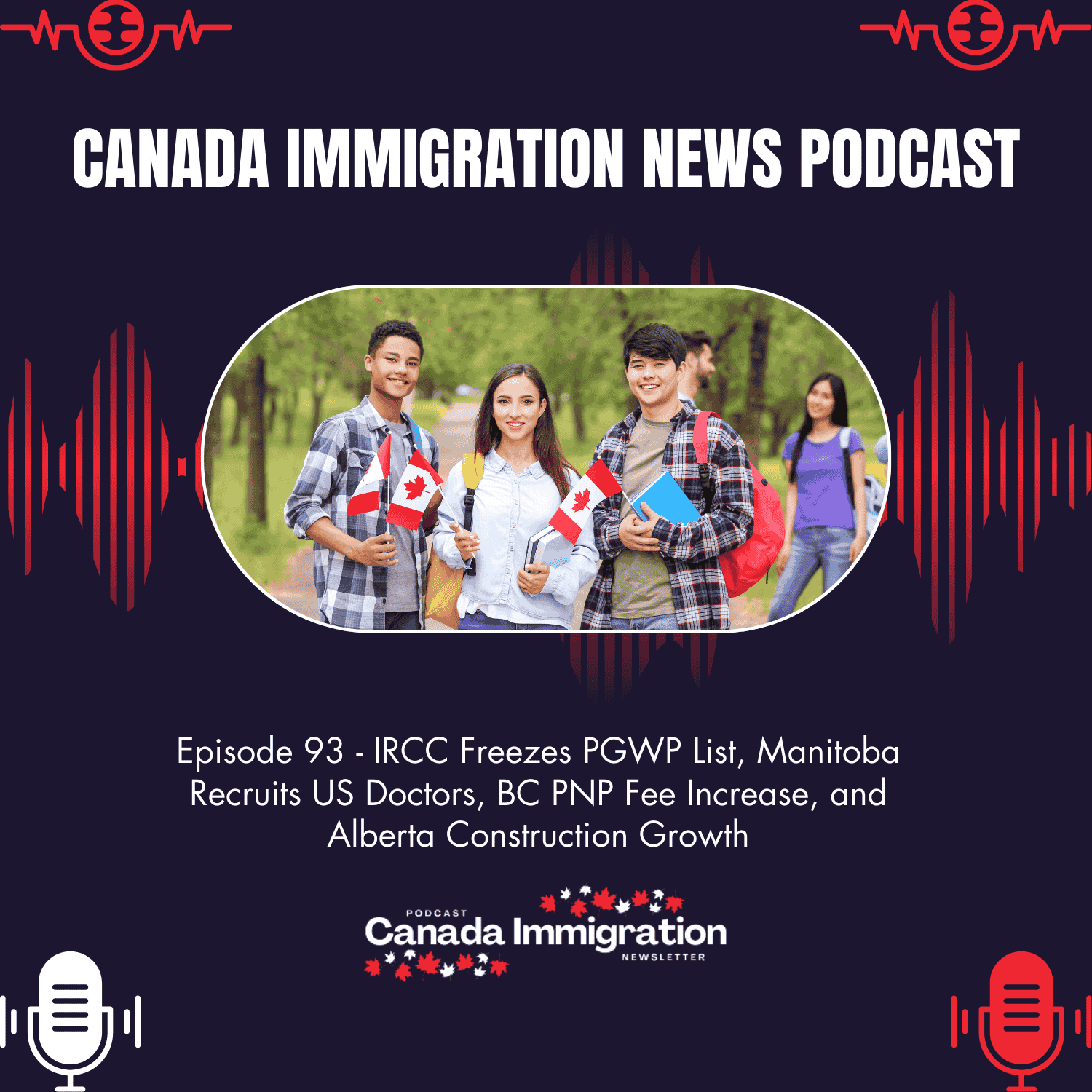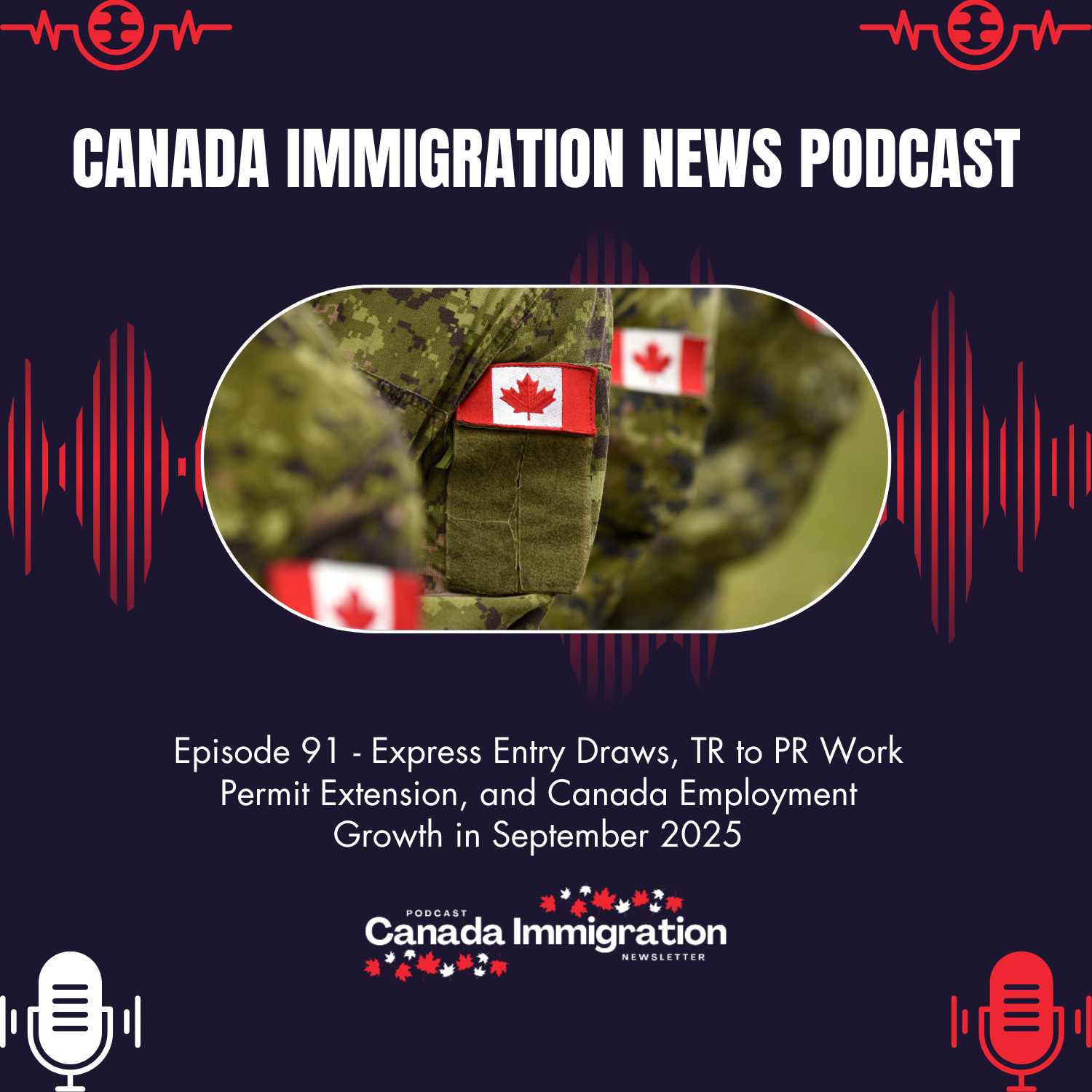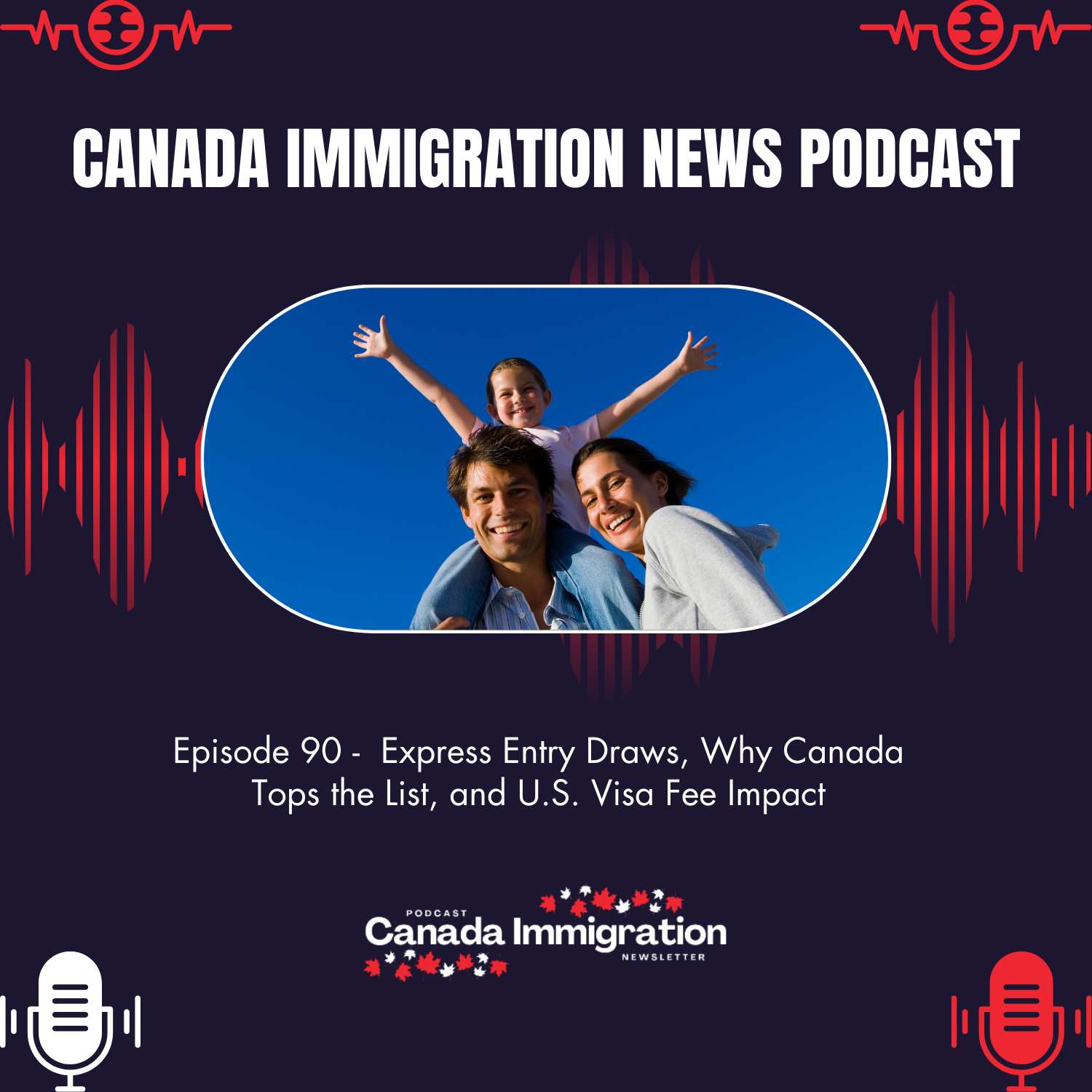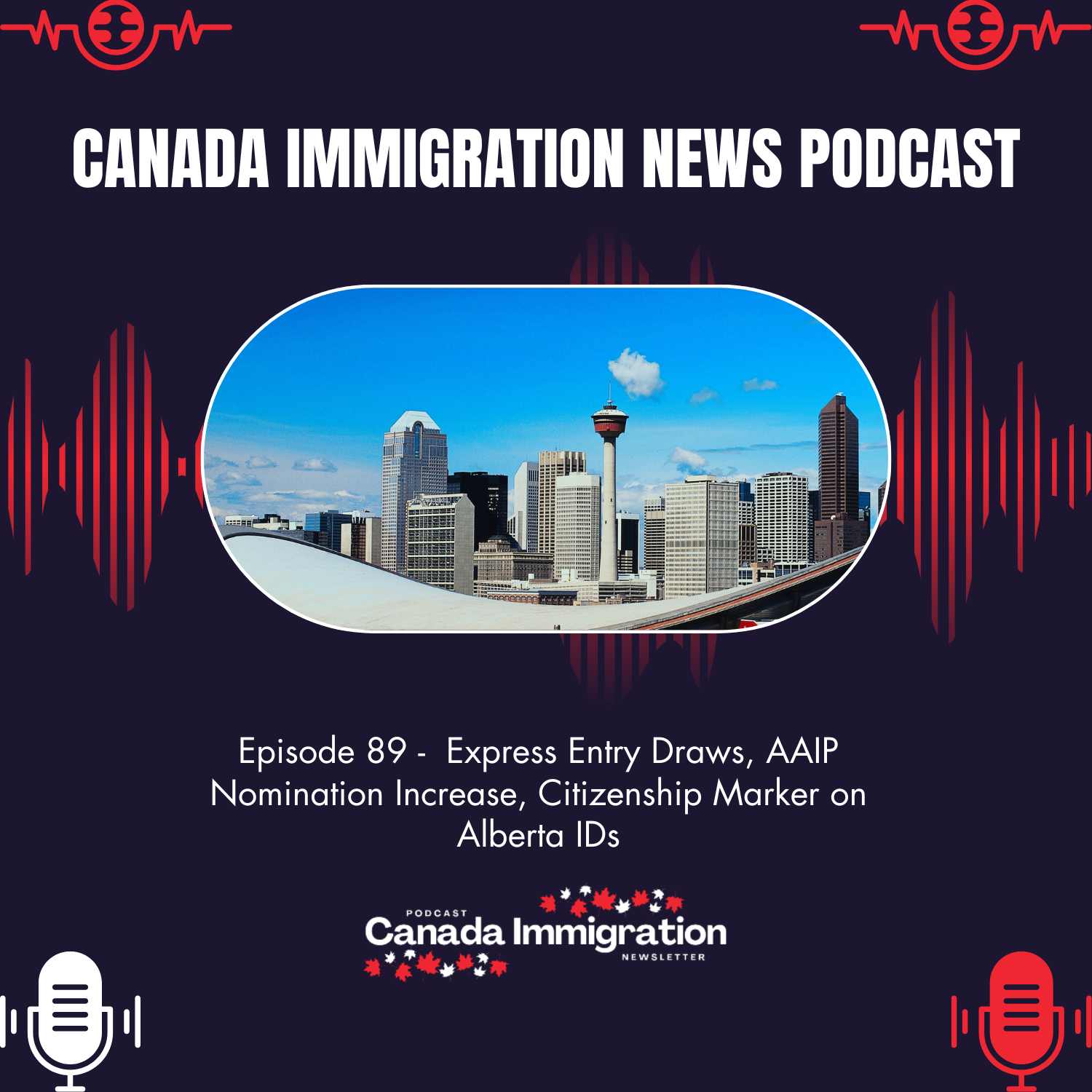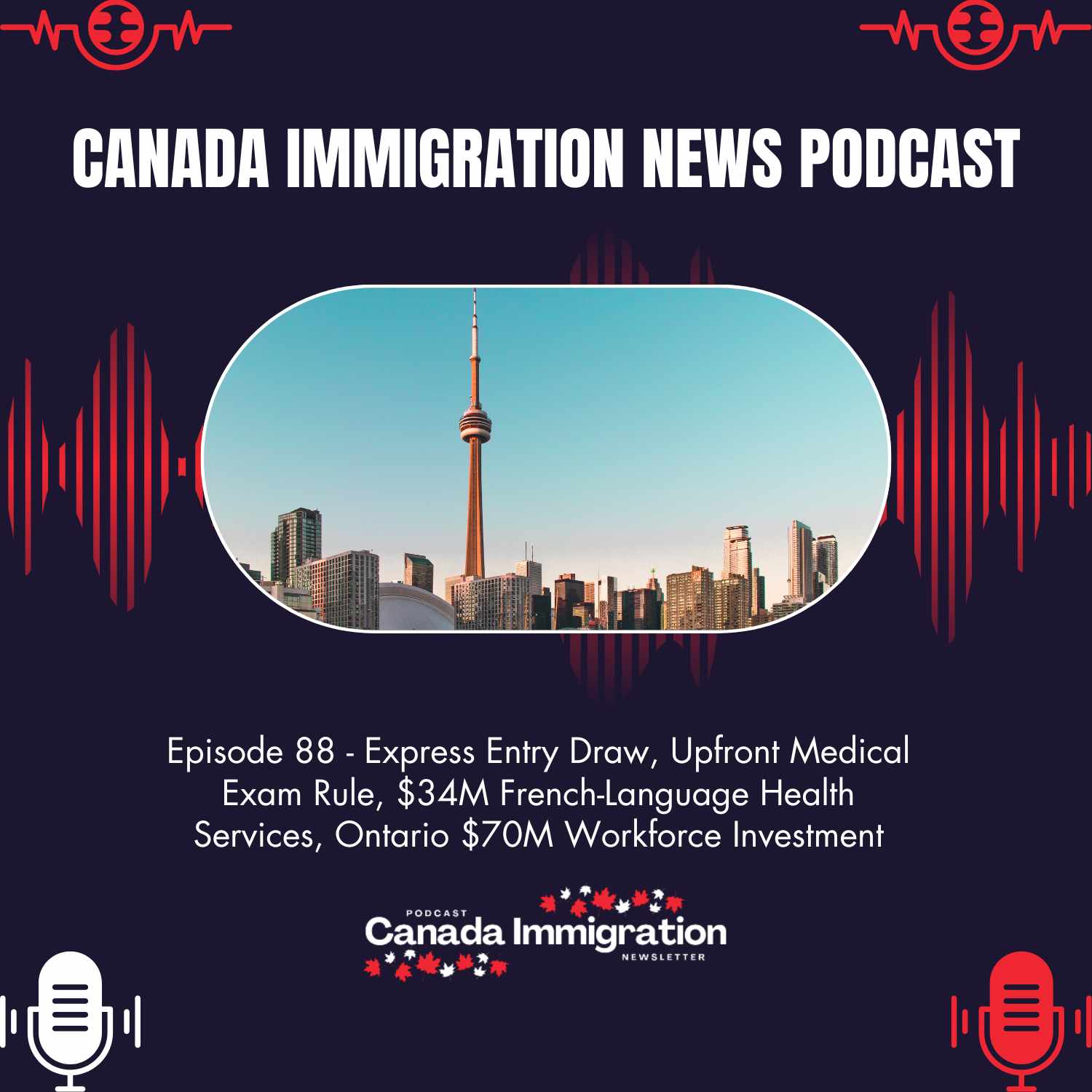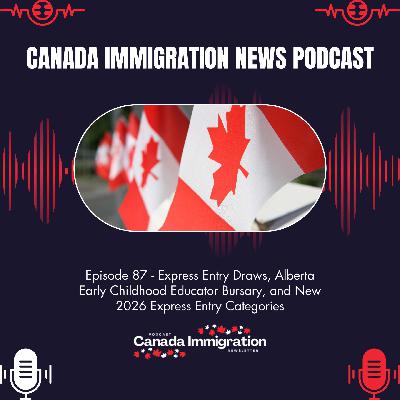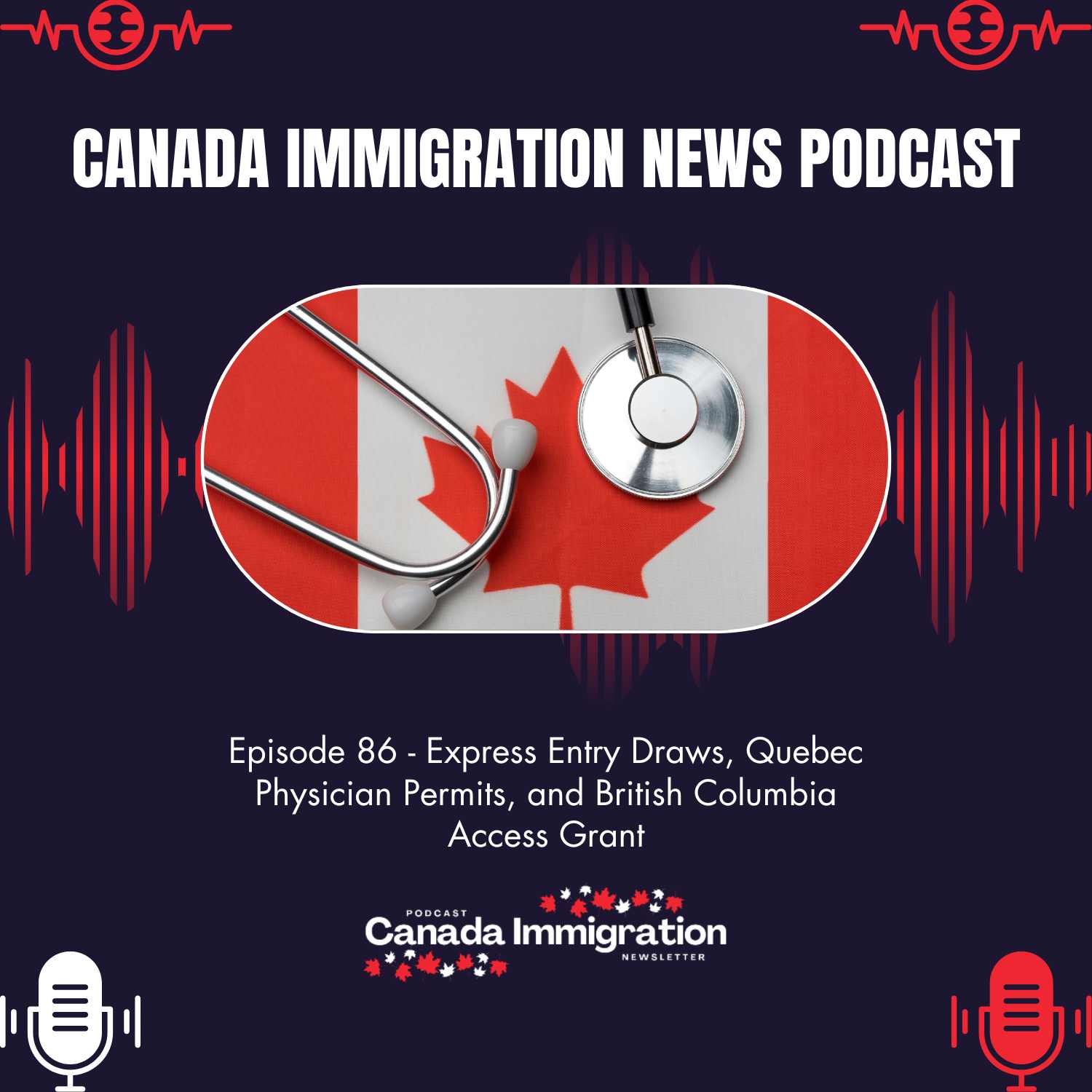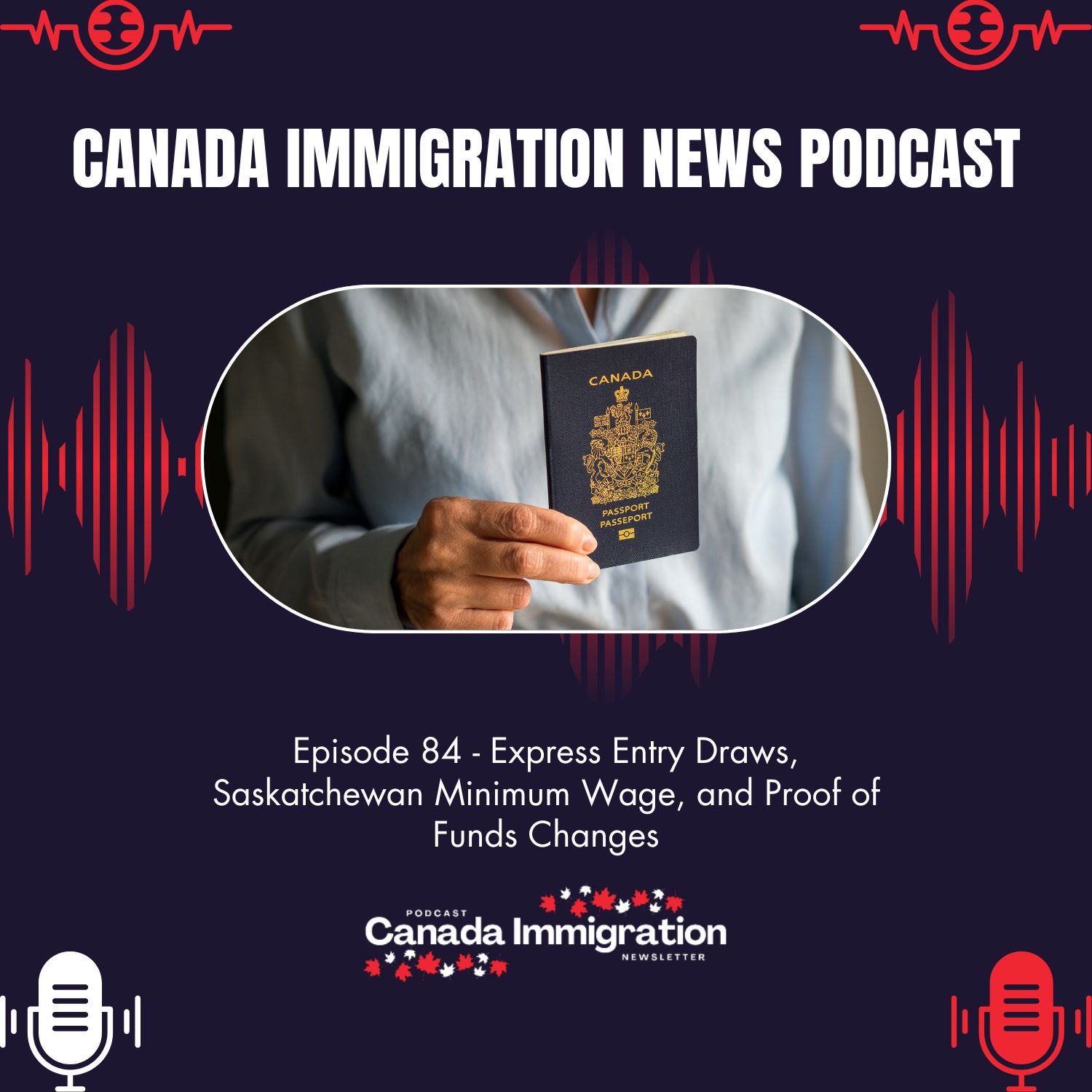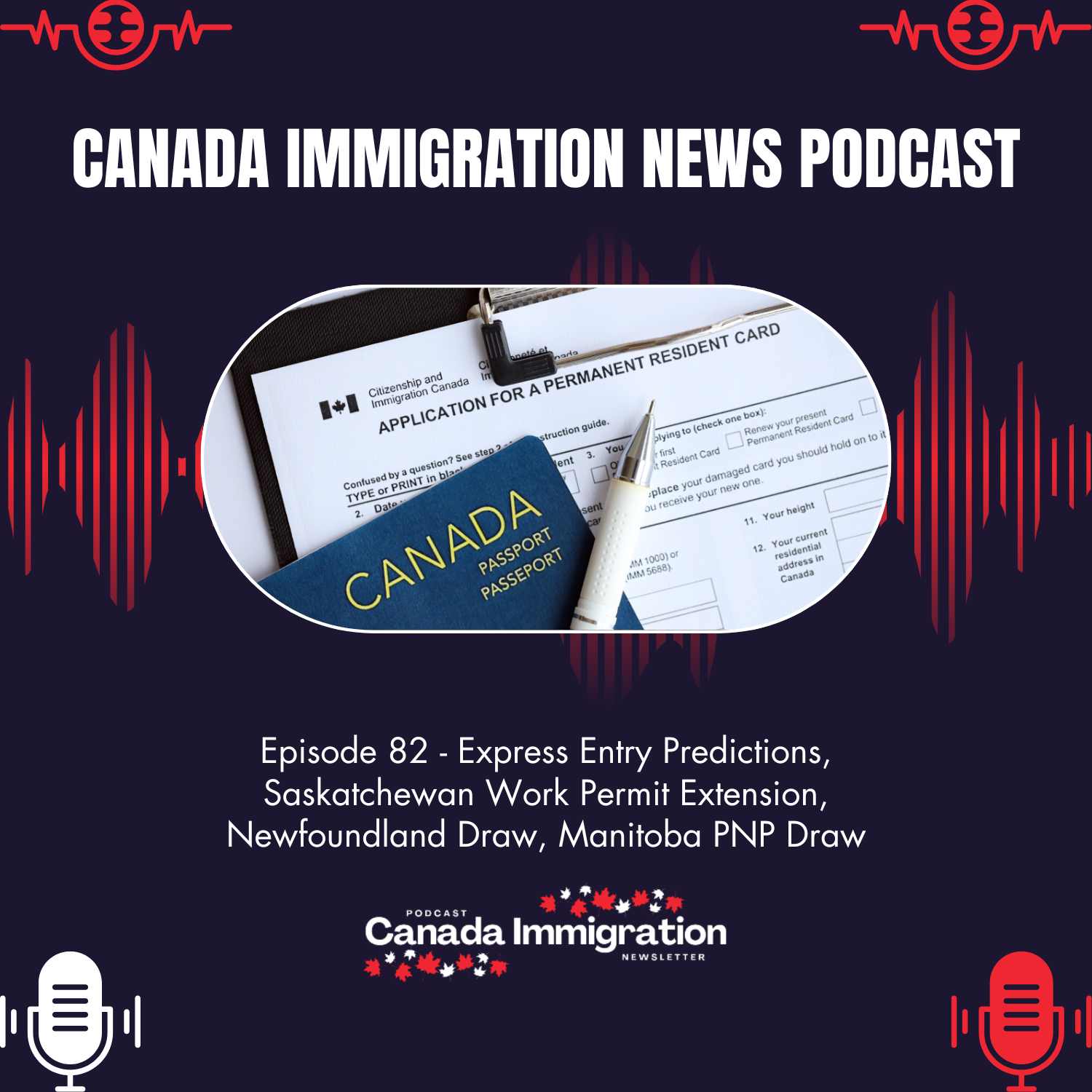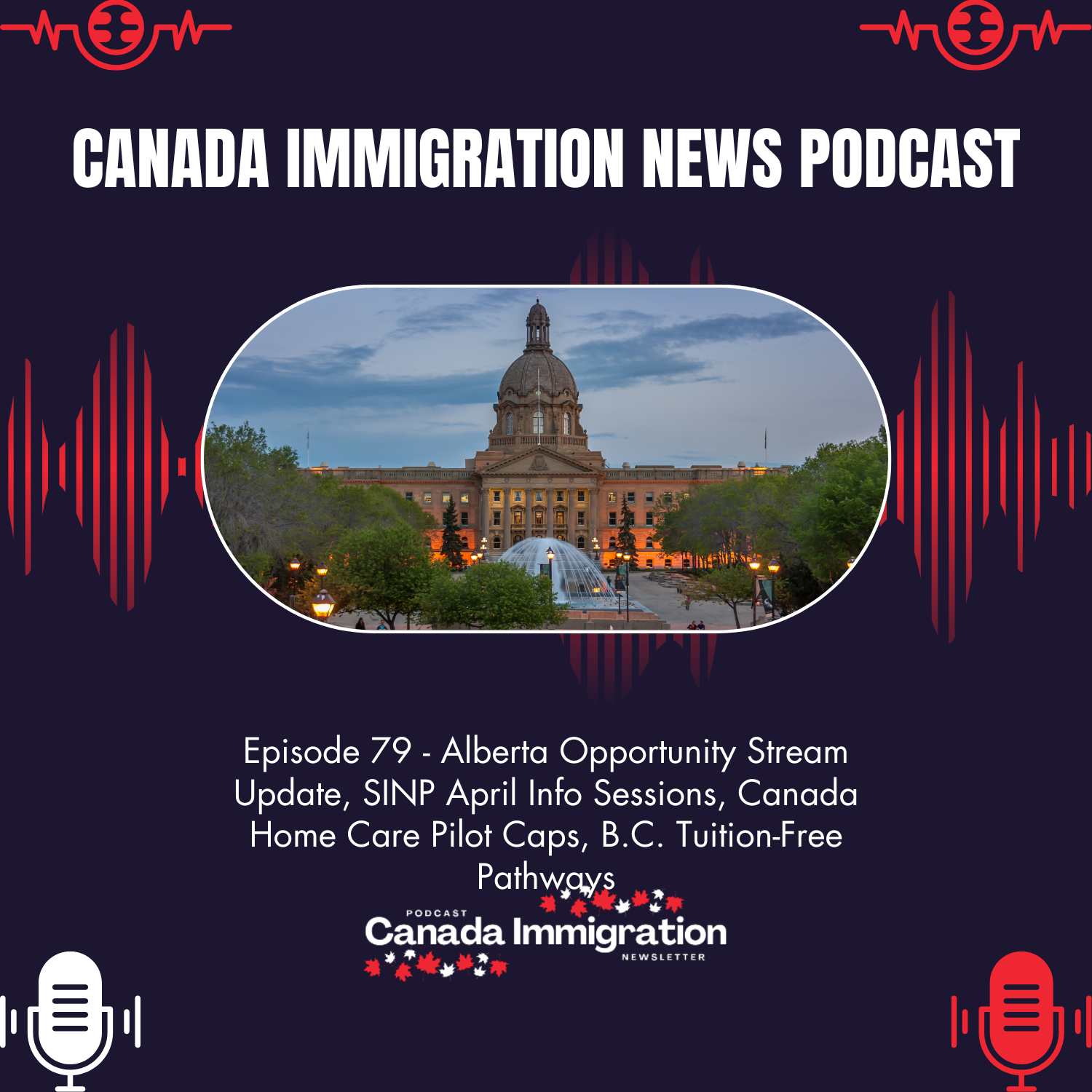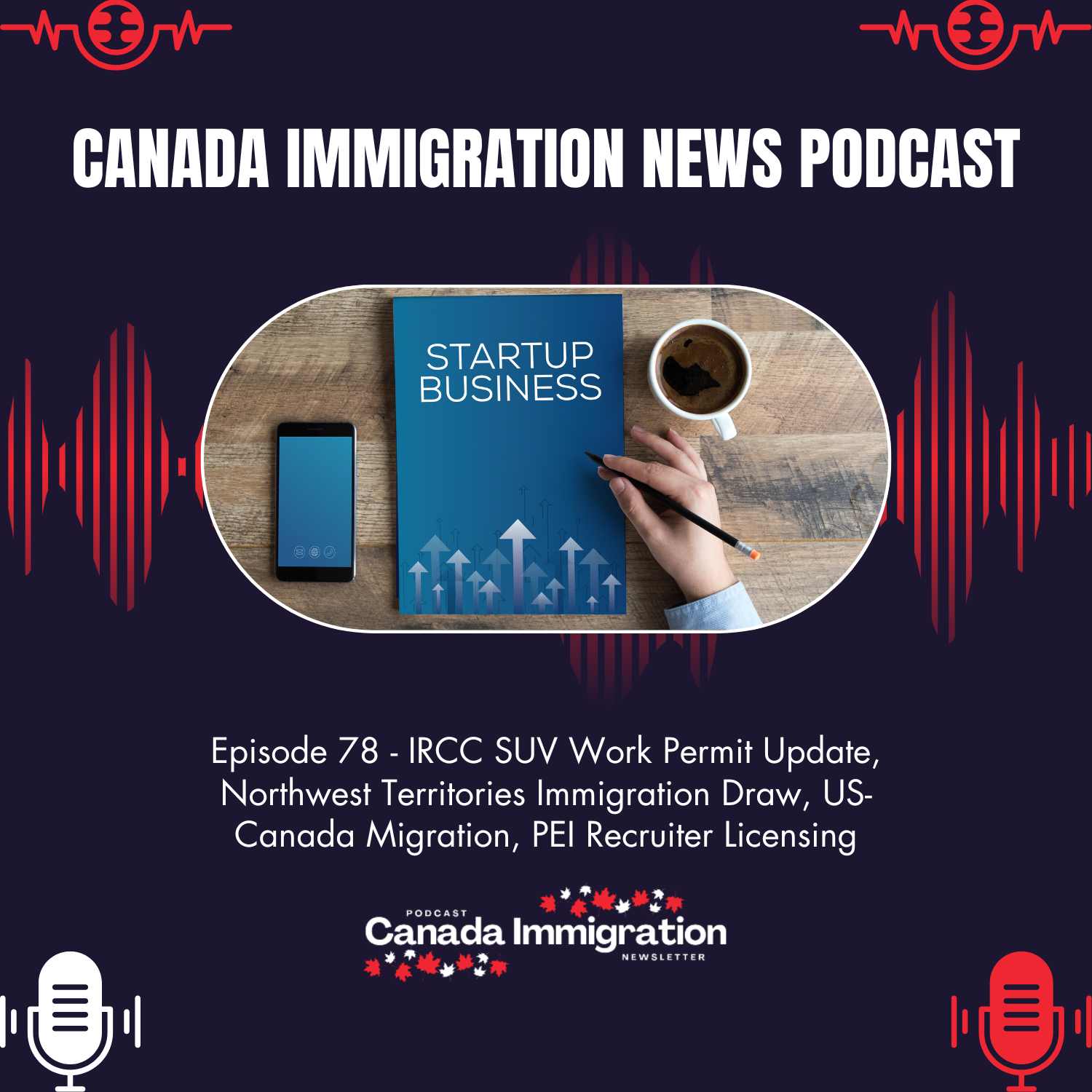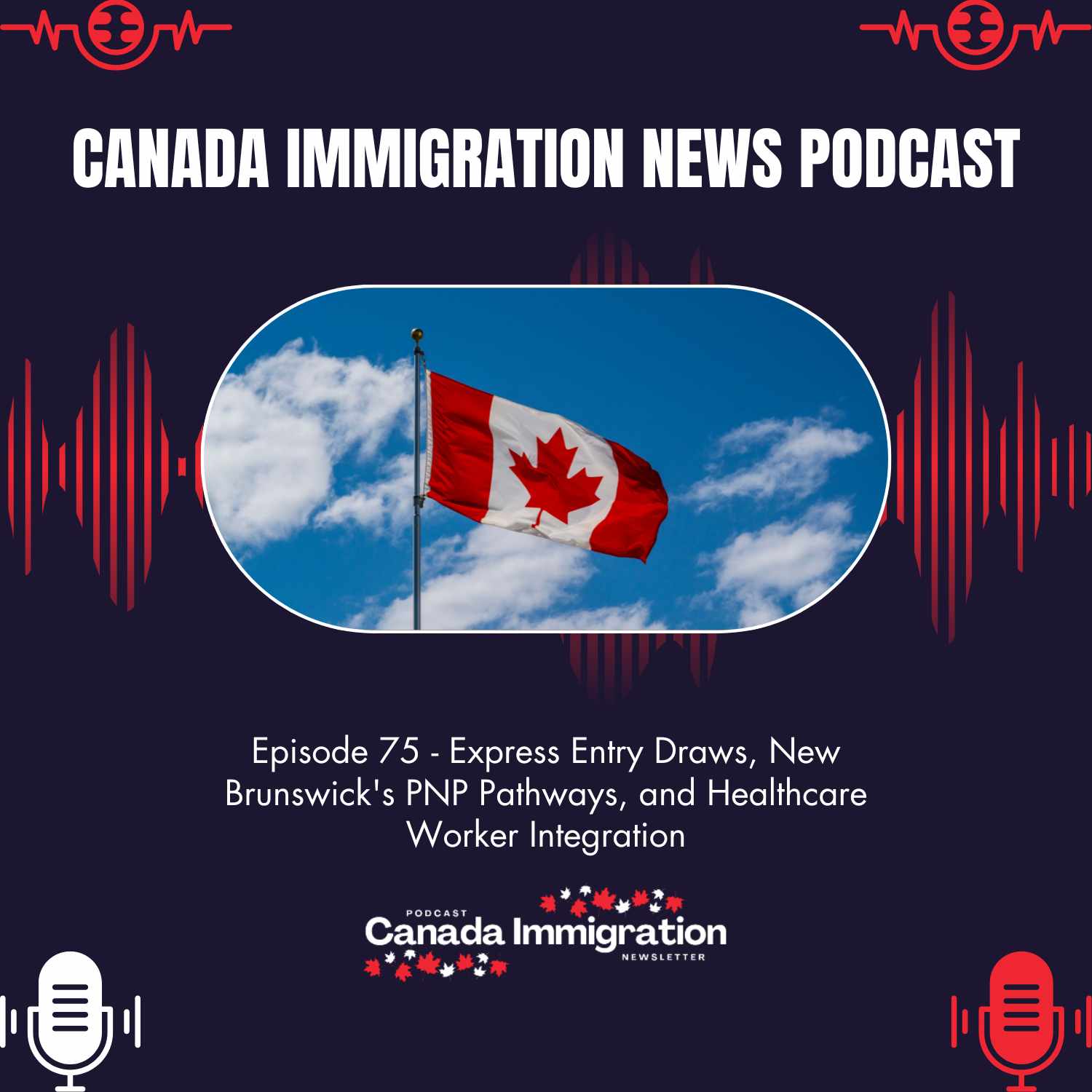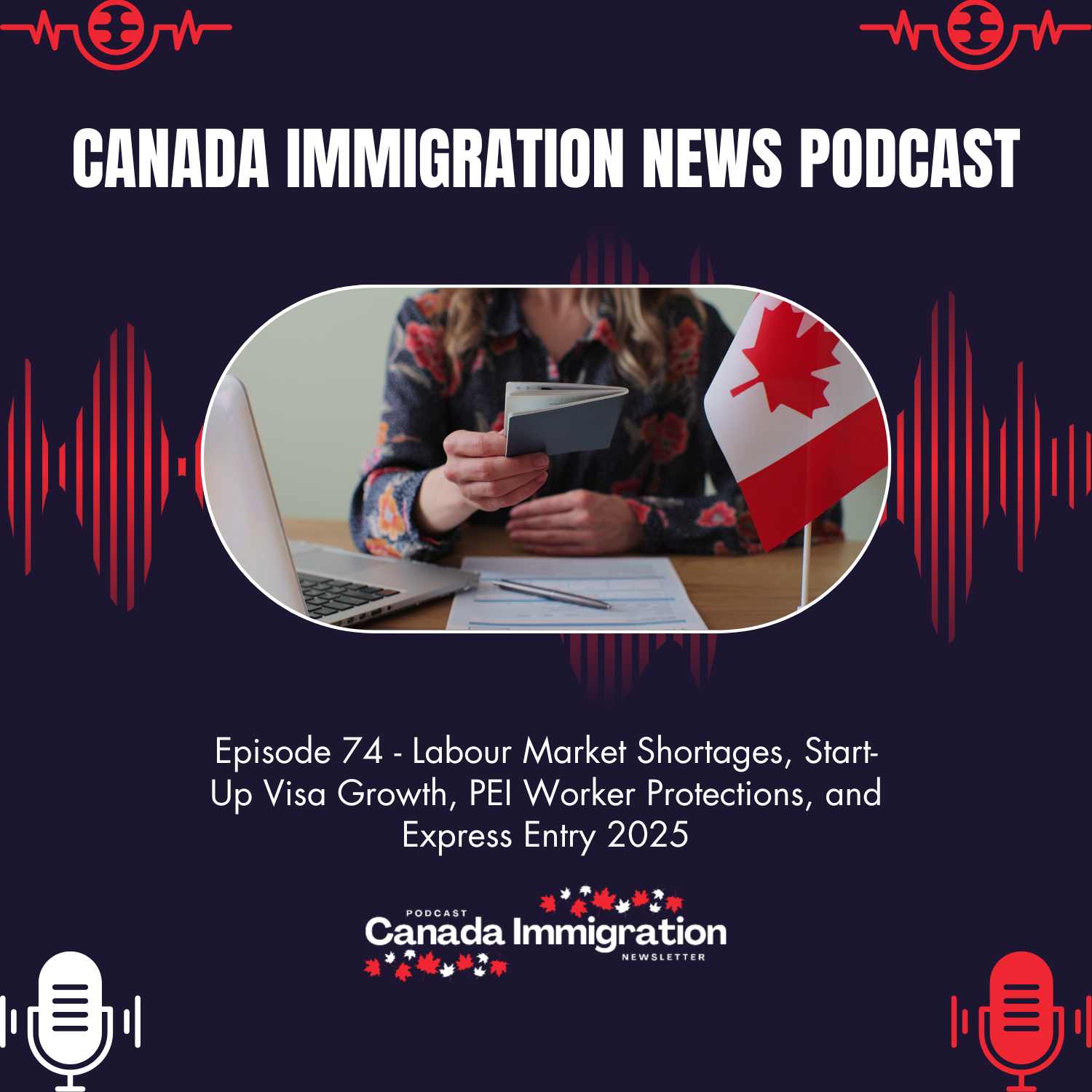Discover Canada Immigration News Podcast
Canada Immigration News Podcast

Canada Immigration News Podcast
Author: Ryan
Subscribed: 21Played: 210Subscribe
Share
© 2024 Canada Immigration News
Description
Canada Immigration News Podcast: Your Go-To Source for Immigration Updates
Feeling overwhelmed by the ever-evolving Canadian immigration landscape? The Canada Immigration News podcast delivers clear and concise updates on the latest news, policies, and programs.
Tune in to each episode as we break down hot topics like Express Entry, Provincial Nominee Programs, and inspiring newcomer stories. Whether you're navigating the immigration process or exploring the idea of making Canada your home, we've got the insights you need.
Subscribe now and start your journey toward the Canadian dream!
Feeling overwhelmed by the ever-evolving Canadian immigration landscape? The Canada Immigration News podcast delivers clear and concise updates on the latest news, policies, and programs.
Tune in to each episode as we break down hot topics like Express Entry, Provincial Nominee Programs, and inspiring newcomer stories. Whether you're navigating the immigration process or exploring the idea of making Canada your home, we've got the insights you need.
Subscribe now and start your journey toward the Canadian dream!
93 Episodes
Reverse
Welcome to episode 93 of the Canada Immigration News Podcast, where we bring you the latest and most impactful updates from Canada’s immigration landscape. In this episode, we unpack Immigration, Refugees and Citizenship Canada’s (IRCC) freeze on the PGWP eligibility list, Manitoba’s recruitment of 13 U.S.-trained physicians, upcoming fee increases for British Columbia’s Provincial Nominee Program (PNP), and Alberta’s record-setting construction and housing growth. These developments reveal how immigration policy, healthcare workforce strategies, provincial program changes, and economic expansion are shaping the future for newcomers across Canada.
IRCC Freezes the Post-Graduation Work Permit Eligibility List
In a move that surprised many international students and advisors, IRCC has temporarily frozen the Post-Graduation Work Permit (PGWP) eligibility list. The freeze means that the current list of designated learning institutions and programs eligible for a PGWP will stay the same while IRCC undertakes a review of criteria and compliance measures. This decision comes amid growing concern over the rapid expansion of unregulated educational providers and quality assurance in post-secondary education. For students planning to study in Canada with the goal of obtaining a PGWP and later applying for permanent residency, this announcement underscores the importance of choosing recognized and high-quality institutions.
Manitoba Recruits 13 U.S.-Trained Physicians to Strengthen Healthcare
Manitoba has taken a proactive step to address its healthcare labour shortages by recruiting 13 U.S.-trained physicians to practice in the province. The successful recruitment reflects collaborative efforts between Manitoba Health and facilities across the province to attract experienced medical professionals. Recruiting internationally trained doctors has been a priority for Manitoba, as the province seeks to enhance access to care, particularly in underserved and rural communities. This initiative not only boosts healthcare capacity but also highlights Manitoba’s commitment to welcoming skilled professionals from diverse international backgrounds.
BC PNP Fee Increase Signals Higher Cost of Provincial Immigration in 2026
British Columbia has announced changes that will impact future Provincial Nominee Program applicants: a fee increase for the B.C. PNP starting in 2026. The fee adjustments reflect rising operational costs, the need to maintain program integrity, and investments in processing capacity. While B.C.’s PNP remains one of the most popular provincial routes to permanent residence due to its alignment with labour market needs, the increased fees signal a shift toward higher participation costs for applicants. Prospective immigrants planning to apply through skills immigration, tech, or entrepreneur streams should factor the higher fees into their planning and timelines for submission.
Alberta Sets New Housing Records as Construction Surges Across the Province
Alberta’s economic momentum continues with new housing and construction records reported across the province. Recent data shows a surge in residential builds, commercial projects, and infrastructure expansion, driven by strong demand and population growth. This construction activity not only reflects broader economic confidence but also creates opportunities for skilled workers, including immigrants with experience in trades, engineering, project management, and related fields. As housing markets tighten in many parts of Canada, Alberta’s construction sector stands out as a source of jobs, investment, and long-term settlement opportunities for newcomers hoping to build careers and roots in Western Canada.
Stay Connected with Canada Immigration News Podcast & Newsletter
Get the latest insights on Canada's immigration policy shifts, provincial program changes, labour market developments, and settlement trends by subscribing to the Canada Immigration News Podcast and newsletter. Join over 2 million subscribers who rely on our detailed coverage and analysis to navigate their immigration journey. Subscribe now to stay informed and ahead of key updates that shape your path to permanent residency in Canada.
Welcome to episode 92 of the Canada Immigration News Podcast. In this episode we break down Express Entry Draw 376 that issued 6,000 ITAs to French-language skilled workers, review the recent Canadian Experience Class Draw 375 and Provincial Nominee Program Draw 374, and explain IRCC’s mandatory upfront medical exam requirement for new Express Entry applications. These developments show how IRCC is balancing category-based selection with document completeness to speed decisions and meet labour needs.
Express Entry Draw 376 Issues 6,000 Invitations for French-Language Skilled Workers
On October 29, 2025, IRCC ran Express Entry Draw 376, issuing 6,000 Invitations to Apply to candidates demonstrating French-language proficiency. The cut-off was 416 and applicants needed CLB 7 or higher in all four skills. Draw 376 underlines Canada’s strategic push to grow Francophone communities outside Quebec and to plug labour gaps where bilingual services matter most. For many candidates with CRS scores in the 400–470 range, strong French results now represent a clear pathway to an earlier invitation.
Canadian Experience Class Draw 375 Continues CEC Stability with CRS 533
The day before, Express Entry Draw 375 targeted the Canadian Experience Class, issuing 1,000 ITAs with a CRS cut-off of 533. CEC draws remain IRCC’s dependable channel for candidates already building careers in Canada. Draw 375 reinforces a pattern of steady CEC thresholds that give temporary workers and international graduates a predictable route to permanent residency when they maintain employment and updated profiles.
Provincial Nominee Draw 374 Shows PNP Demand with CRS 761
Express Entry Draw 374 on October 27 focused on Provincial Nominee Program candidates, issuing 302 ITAs with a CRS cut-off of 761. PNP draws continue to prioritize regional labour needs and reward provincial nominations with a 600-point boost, often guaranteeing an ITA for nominated candidates. Draw 374’s score shows that while PNPs are powerful, competition remains intense, getting a provincial nomination is still a game changer for many applicants.
IRCC Tightens Rules with Mandatory Upfront Medical Exams for Express Entry
IRCC has ended the facilitation period that allowed some Express Entry files to be submitted without medicals. As of October 21, 2025, new Express Entry applications must include a completed Immigration Medical Examination (IME) at submission. This completeness check aims to reduce in-process delays, lower back-and-forth on medical admissibility, and speed final decisions. Applicants should book IRCC-approved panel physicians early, gather IME receipts/UME numbers, and ensure exams remain valid through processing.
How These Changes Affect Candidates Now:
Category-based draws like 376 (French) and 375 (CEC) show opportunity for candidates who align skills with IRCC priorities: bilingual candidates, those with Canadian work experience, and provincially nominated applicants. The new medical rule means preparedness matters more than ever. Submitting a complete PR application with IME proof reduces the risk of rejection and shortens wait times. Candidates should update profiles, confirm language test validity, secure panel physician bookings, and consider provincial pathways that match their occupation.
Subscribe to Canada Immigration News Podcast & Newsletter
Get timely analysis of every Express Entry draw, PNP update, and IRCC policy change. Join our community of over 2 million subscribers for weekly episodes and a newsletter packed with draw predictions, how-to guides, and settlement tips. Subscribe to the Canada Immigration News Podcast and sign up for our newsletter to stay informed and ahead.
Canada Immigration News Podcast #91 brings you a comprehensive roundup of the latest updates from Immigration, Refugees and Citizenship Canada (IRCC) and Statistics Canada. In this episode, we discuss Express Entry Draw 372, inviting 345 Provincial Nominee Program (PNP) candidates with a CRS of 778, the latest healthcare-targeted draw for 2,500 skilled professionals, the TR to PR open work permit extension until 2026, and Canada’s employment growth in September 2025. Each of these stories reflects how Canada continues to strengthen its workforce, streamline immigration, and provide opportunities for newcomers.
Express Entry Draw 372 Invites 345 Provincial Nominee Program Candidates
On October 14, 2025, IRCC conducted Express Entry Draw #372, inviting 345 candidates under the Provincial Nominee Program. The minimum Comprehensive Ranking System (CRS) score was 778, making it one of the more competitive draws of the year. Candidates with provincial nominations received an automatic 600-point boost, positioning them well above the general Express Entry pool.
So far in 2025, IRCC has held 42 draws, with a steady emphasis on targeted invitations rather than large-scale all-program draws. The higher CRS cut-offs reflect several factors, including reduced immigration targets, temporary pauses in Canadian Experience Class draws earlier in the year, and increased global demand for Canadian permanent residency. This PNP draw underscores the critical role provinces play in addressing regional labor market shortages and highlights the ongoing competitiveness of the Express Entry system.
IRCC Healthcare Draw Invites 2,500 Skilled Professionals with CRS 472
On the same day, IRCC issued another 2,500 Invitations to Apply under the Healthcare and Social Services category. The CRS cut-off for this round was 472, and profiles created before May 12, 2025, were eligible. This was the fifth healthcare-focused draw of the year, bringing the total invitations for 2025 in this category to nearly 10,000.
The consistent series of healthcare draws demonstrates Canada’s strong commitment to filling vacancies across its medical and social care systems. Provinces such as Ontario, Alberta, and British Columbia continue to experience sustained demand for nurses, physicians, therapists, and support workers. These targeted rounds not only help meet national healthcare needs but also open permanent residency pathways for international medical professionals already contributing to Canada’s workforce.
TR to PR Open Work Permit Extended Until December 31, 2026
In another major policy update, Immigration, Refugees and Citizenship Canada (IRCC) has extended the TR to PR open work permit program until December 31, 2026. This extension allows temporary residents who applied for permanent residency through the 2021 TR to PR streams to continue working in Canada without interruption while their applications are processed.
The revised policy also expands eligibility to certain family members outside Canada, ensuring better family reunification and reducing the need for repeated permit renewals. Applicants under healthcare, essential worker, and international graduate streams will benefit the most, gaining stability while they await permanent status. This decision reflects IRCC’s efforts to simplify transitions for temporary workers and maintain workforce continuity across critical industries.
Canada Adds 60,000 Jobs in September 2025 Amid Economic Growth
Canada’s latest employment report from Statistics Canada shows that 60,000 new jobs were added in September 2025, marking a 0.3% rise in overall employment. The national employment rate climbed to 60.6%, while the unemployment rate remained steady at 7.1%.
The growth was strongest among core-aged workers (25–54 years old), particularly women, and was driven by hiring in manufacturing, healthcare, and agriculture. Alberta led provincial gains with 43,000 new jobs, followed by Manitoba and New Brunswick. Meanwhile, the average hourly wage rose 3.3% year-over-year to $36.78, signaling improved earnings potential despite economic uncertainty.
The data reflects a shift toward full-time employment, with 106,000 new full-time positions offsetting part-time job losses. For newcomers and work permit holders, these labor trends indicate a resilient and expanding job market, especially in high-demand sectors that continue to align with Canada’s immigration priorities.
Subscribe to Canada Immigration News Podcast and Newsletter
Join over 2 million subscribers who rely on the Canada Immigration News Podcast for timely updates on Express Entry draws, work permits, and Canada’s job market trends. Stay informed, stay prepared, and never miss a major immigration announcement. Subscribe now to our podcast and newsletter to receive expert insights directly in your inbox every week.
Canada Immigration News Podcast #90 explores a series of significant immigration developments shaping Canada’s pathway for skilled workers. This week, we cover Express Entry Draw 370 targeting Canadian Experience Class (CEC) candidates, the record-breaking French-language draw, global migration trends that keep Canada as the #1 destination, and how a new U.S. visa fee could help Canada attract more tech talent. These updates highlight Canada’s continued focus on skilled immigration and inclusivity as key drivers of its economic and social growth.
Express Entry Draw 370 Invites 1,000 Canadian Experience Class Candidates
On October 1, 2025, Immigration, Refugees and Citizenship Canada (IRCC) held Express Entry Draw #370, exclusively for candidates under the Canadian Experience Class. In this draw, 1,000 Invitations to Apply (ITAs) were issued, and the minimum Comprehensive Ranking System (CRS) score was 534 — consistent with the previous two CEC-specific rounds. The tie-breaking rule for this draw was set for February 21, 2025, at 04:01:57 UTC.
This draw reaffirms IRCC’s ongoing focus on transitioning skilled workers already employed in Canada to permanent residency. Candidates with Canadian work experience tend to integrate faster into the labor market and local communities, contributing to Canada’s long-term economic resilience. The steady CRS threshold also signals predictability for future applicants planning their CEC profiles.
Express Entry Draw 371 Highlights French Language Proficiency Candidates
Just days later, on October 6, 2025, IRCC held Express Entry Draw #371, issuing 4,500 Invitations to Apply to candidates with French-language proficiency. The CRS cut-off for this draw was 432, with eligibility limited to profiles submitted before June 13, 2025, at 7:07 p.m. UTC.
This French-language draw was one of the largest of the year, emphasizing Canada’s commitment to boosting Francophone immigration outside Quebec. By awarding additional CRS points to French-speaking candidates, IRCC continues to strengthen Canada’s bilingual identity and meet labor needs in provinces like Ontario, Manitoba, and New Brunswick. The focus on Francophone applicants also aligns with Canada’s broader strategy to support linguistic diversity and rural population growth.
Why Canada Tops the List of the World’s Most Desired Immigration Destinations
A recent global survey ranked Canada as the #1 choice for individuals planning to move abroad. The findings highlighted quality of life, career growth, and cultural diversity as the top motivators behind the preference. For many, Canada represents the perfect balance between opportunity and stability.
The country’s clean environment, inclusive policies, and access to universal healthcare make it a top destination for families and professionals alike. Beyond employment prospects, Canada’s multicultural cities and welcoming communities provide a sense of belonging for newcomers. Whether one values financial security, lifestyle balance, or personal growth, Canada consistently stands out as the place where all these aspirations converge.
U.S. Visa Fee Hike Creates Opportunity for Canada’s Tech Sector
The United States recently announced a $1,000 annual fee for H-1B worker visas, which could reshape global competition for skilled professionals. This decision may discourage U.S. employers from hiring international talent — but it opens a door for Canada.
With its streamlined immigration pathways such as Express Entry, the Global Talent Stream, and tech-focused Provincial Nominee Programs, Canada offers an appealing alternative for skilled professionals in technology, engineering, and innovation. Industry experts predict that the new U.S. fee will drive more tech workers north, particularly as Canada continues to provide clear routes from temporary work to permanent residence.
This shift reinforces Canada’s reputation as a global hub for innovation and skilled immigration. As the world’s top talent seeks stability and long-term opportunity, Canada’s welcoming policies make it an increasingly attractive destination.
Stay Connected with Canada Immigration News Podcast
Stay informed about every new Express Entry draw, policy change, and immigration update with the Canada Immigration News Podcast. Join over 2 million subscribers who rely on us for accurate, real-time information about Canada’s immigration system. Subscribe to our podcast and newsletter today and never miss an update on your journey to becoming a permanent resident of Canada.
Canada Immigration News Podcast #89 brings you the latest updates shaping immigration opportunities in Canada. This week’s episode covers Express Entry Draw 367 for education professionals with a CRS cut-off of 462, the first trade occupations draw of 2025, Alberta’s increase in AAIP nominations, and the upcoming addition of a Canadian citizenship marker to Alberta driver’s licenses and ID cards. These developments highlight how Canada is adapting its immigration system to meet workforce demands while also enhancing identity verification and settlement supports.
Express Entry Draw 367 Opens Opportunities for Education Professionals
On September 17, 2025, Immigration, Refugees and Citizenship Canada (IRCC) conducted Express Entry Draw 367, targeting the education category. A total of 2,500 Invitations to Apply (ITAs) were issued with a Comprehensive Ranking System (CRS) cut-off of 462, the lowest for this category in 2025 outside of French-language draws. The occupations eligible under this draw include early childhood educators, elementary and secondary school teachers, special needs instructors, and teaching assistants. For many candidates in the education sector, this round provides a strong opportunity to transition to permanent residency, reflecting Canada’s recognition of the critical role educators play in supporting a growing population and strengthening communities.
Express Entry Draw 368 Prioritizes Trade Occupations
Just days after the education-focused round, IRCC held Express Entry Draw 368 for trade occupations. In this draw, 1,250 invitations were issued, with a CRS cut-off of 505. Eligible candidates needed to have submitted their profiles before November 5, 2025. This was the first trades-focused round in nearly a year, and it underscored the high demand for skilled tradespeople across Canada. Sectors such as construction, mechanics, welding, and electrical work remain vital to the economy. Although the CRS cut-off was higher than in other category-based draws, the inclusion of trade occupations demonstrates Canada’s continued commitment to attracting workers in these essential roles.
IRCC Increases Alberta AAIP Nomination Capacity for 2025
Another important update comes from Alberta, where IRCC announced an increase in the Alberta Advantage Immigration Program (AAIP) nomination allocations. For 2025, Alberta’s allocation has risen by 1,528 spots, bringing the total to 6,403 nominations. The AAIP provides pathways for skilled workers, entrepreneurs, and graduates to gain provincial nominations and accelerate their route to permanent residency. With Alberta’s economy growing in key sectors such as energy, healthcare, agriculture, and technology, this increase ensures that employers have access to the talent they need while newcomers benefit from more opportunities to settle in the province. The higher allocation also signals IRCC’s recognition of Alberta’s expanding role in Canada’s overall immigration strategy.
Alberta Introduces Canadian Citizenship Marker on IDs and Driver’s Licenses
Looking ahead to 2026, Alberta is set to launch a new Canadian citizenship marker on all newly issued and renewed driver’s licenses and provincial ID cards. This change will allow residents to prove both their identity and citizenship using a single document, reducing the need to carry multiple forms of identification. The measure is also designed to safeguard democratic processes by making it easier to verify voter eligibility. For new Canadian citizens, the change means proof of citizenship will be required when applying for or renewing identification starting in the fall of 2026. Alberta’s decision aligns with international best practices and reflects a broader shift toward secure, efficient identity verification systems.
Stay Connected with Canada Immigration News Podcast
Canada Immigration News Podcast continues to provide trusted, timely updates on Express Entry draws, provincial immigration programs, and settlement changes that affect future Canadians. With over 2 million subscribers worldwide, the podcast and newsletter deliver essential insights for anyone planning their immigration journey. Subscribe today to stay informed about the latest opportunities and policies that could shape your path to permanent residency in Canada.
Canada Immigration News Podcast #88 brings you another round of essential updates shaping Canada’s immigration system. This week’s episode covers Express Entry Draw 362 targeting healthcare and social services workers, IRCC’s new upfront medical exam rule for Express Entry applicants, Canada’s $34 million investment in French-language health services to support Francophone immigration, and Ontario’s $70 million workforce investment to protect workers and strengthen the economy. Together, these developments highlight how Canada continues to evolve its immigration system to meet urgent workforce needs and improve settlement opportunities.
Express Entry Draw 362 Focuses on Healthcare and Social Services
On August 19, 2025, Immigration, Refugees and Citizenship Canada (IRCC) held Express Entry Draw 362, issuing 2,500 Invitations to Apply (ITAs) to candidates in healthcare and social services. The Comprehensive Ranking System (CRS) cut-off was 470, with a tie-break of April 23, 2025. This was the lowest CRS requirement for a healthcare-focused draw so far in 2025, signaling that Canada is prioritizing care professionals in the 470–475 CRS band. Eligible occupations included registered nurses, physicians, pharmacists, social workers, and community service professionals. For many candidates in health and care-related roles, this round provided a faster route to permanent residency.
New Upfront Medical Exam Requirement for Express Entry Applicants
Beginning August 21, 2025, IRCC has introduced a new requirement for most Express Entry applicants: completing an upfront medical exam before submitting a permanent residence application. This policy shift means that medical results must now be included with the initial PR application, reducing delays and ensuring faster processing. While some applicants inside Canada can reuse a recent Immigration Medical Exam (IME) if completed within the last five years, most new applicants will need to schedule an exam with an approved panel physician. This change reflects IRCC’s effort to streamline the process, minimize back-and-forth requests, and deliver quicker decisions for Express Entry candidates.
Canada Invests $34 Million in French-Language Health Services
On August 18, 2025, the Canadian government announced a $34 million investment to expand French-language health services in Ontario. The funding will enhance access to care for Francophone communities, supporting family medicine, community clinics, mental health services, and hospitals. For French-speaking immigrants, access to healthcare in their first official language improves both settlement outcomes and long-term well-being. This initiative also strengthens Canada’s broader Francophone immigration strategy, ensuring that French-speaking newcomers can access services and thrive in their communities. It aligns with ongoing programs such as the Ontario Immigrant Nominee Program (OINP) French-Speaking Skilled Worker Stream and federal category-based draws for Francophone candidates.
Ontario Allocates $70 Million to Protect Workers and Strengthen the Economy
Ontario is also making a significant investment to support its workforce in response to global economic pressures and shifting trade dynamics. The province announced $70 million in funding for two initiatives: Protect Ontario Workers Employment Response (POWER) Centres and the Better Jobs Ontario program. POWER Centres will act as rapid-response hubs for workers facing layoffs, offering job search assistance and retraining resources. Better Jobs Ontario will expand tuition and training support for individuals transitioning into high-demand fields. For newcomers and residents alike, this funding provides opportunities to access training, upskill for the evolving job market, and secure stable employment in sectors such as healthcare, technology, and advanced manufacturing.
Stay Connected with Canada Immigration News Podcast
The Canada Immigration News Podcast continues to be the trusted source for up-to-date coverage of immigration draws, policy changes, and settlement resources. With more than 2 million subscribers worldwide, our community of future Canadians relies on timely, accurate insights to guide their journey. Subscribe today to the Canada Immigration News Podcast and newsletter to stay ahead of every update that could shape your path to permanent residency in Canada.
Canada Immigration News Podcast #87 brings you the latest updates shaping Canada’s immigration landscape. In this episode, we cover Express Entry Draw 360 that targeted French-speaking candidates, the latest draw for Provincial Nominee Program (PNP) candidates with a CRS of 800, upcoming 2026 Express Entry categories, and Alberta’s investment in an Early Childhood Educator Bursary. Each of these developments highlights how Canada continues to refine its immigration pathways while responding to workforce needs and community priorities.
Canada Targets French-Speaking Candidates in Express Entry Draw 360
On August 8, 2025, Immigration, Refugees and Citizenship Canada (IRCC) held its third draw of the week, Express Entry Draw 360, focusing on French-speaking candidates. A total of 2,500 Invitations to Apply (ITAs) were issued, with a minimum Comprehensive Ranking System (CRS) score of 481. This strategy underscores Canada’s commitment to building Francophone communities outside Quebec and strengthening bilingual workforces. French speakers gain not only lower CRS cut-offs but also additional points for bilingualism, giving them a significant advantage compared to other categories.
Provincial Nominee Program Candidates Receive ITAs with CRS 800
The week also saw Canada issue invitations to 192 PNP candidates on August 18, 2025. With a CRS cut-off of 800, this draw highlighted the continued importance of provincial nominations in Express Entry. Candidates nominated through provincial programs benefit from an automatic 600-point boost, making their profiles highly competitive. As Canada balances program-specific and category-based draws, PNP candidates remain central to meeting regional labour market demands and filling skill shortages across the provinces.
New 2026 Express Entry Categories Announced
Looking ahead, Immigration, Refugees and Citizenship Canada has revealed that new categories will be added to Express Entry in 2026. In addition to the current six categories, which include healthcare, STEM, trades, agriculture, education, and French-language proficiency, three more will be introduced: Leadership and Senior Management, Researchers and Scientists, and Highly Skilled Military Recruits. These updates demonstrate Canada’s forward-thinking approach to aligning immigration intake with future economic needs. Skilled professionals in these new categories will have greater opportunities to secure permanent residency through a more targeted selection process.
Alberta Expands Early Childhood Educator Bursary
Immigration and education are closely connected, and Alberta is addressing a critical workforce need by investing $3.3 million into its Early Childhood Educator Bursary program. This initiative provides $10,000 in tuition support for 300 students over the next three years, helping them complete certificate programs and enter licensed child-care centres. Alberta continues to face staffing shortages in early learning, and this bursary aims to remove financial barriers while encouraging more people to pursue careers in child care. For international students and newcomers considering careers in early childhood education, this investment highlights new pathways into meaningful employment in Canada.
Subscribe to Canada Immigration News Podcast and Newsletter
With more than 2 million subscribers, the Canada Immigration News Podcast and newsletter provide the most trusted updates on Express Entry draws, immigration policy changes, and settlement opportunities. Don’t miss your chance to stay informed and ahead of the curve. Subscribe today and join our growing global community of future Canadians.
Welcome to Canada Immigration News Podcast #86, your trusted source for the latest developments in Canadian immigration. In this episode, we explore the newest Express Entry PNP and CEC draws, Quebec’s streamlined process for foreign physicians, and how the British Columbia Access Grant continues to make education more affordable. These updates highlight how Canada’s immigration and education systems are working together to attract talent and strengthen communities.
Express Entry Opens August with 225 ITAs for PNP Candidates
Canada began August 2025 with a targeted Express Entry draw for Provincial Nominee Program (PNP) candidates. On August 6, 2025, IRCC issued 225 Invitations to Apply (ITAs) with a minimum CRS score of 739. Eligibility was limited to candidates who submitted their Express Entry profile before April 23, 2025, at 6:35 a.m. UTC.
PNP draws remain significant because provincial nominations provide an automatic 600-point boost, making selection almost guaranteed. This draw reflects Canada’s continued reliance on PNPs to address specific regional labor needs and ensure that immigration benefits provinces and territories directly.
Express Entry Draw Invites 1,000 CEC Candidates with CRS 534
Just a day later, on August 7, 2025, IRCC conducted Express Entry draw #359, inviting 1,000 Canadian Experience Class (CEC) candidates with a cut-off score of 534. The CEC category favors skilled workers who already have Canadian work experience, highlighting the value of in-country employment for permanent residency prospects.
This year has seen fluctuating CRS scores for CEC draws, with recent cut-offs ranging between 518 and 547. The latest results reaffirm that skilled workers already contributing to Canada’s labor market remain a priority in the federal immigration strategy.
Quebec Simplifies Work Permits for Foreign Physicians
Quebec has introduced a major change to make it easier for foreign-trained doctors to work in underserved regions. Starting July 31, 2025, physicians will only need a single employer-specific C10 work permit, valid for up to five years. This replaces the previous two-step process that required both an assessment permit and a practice permit.
The streamlined system reduces paperwork, speeds up integration, and allows healthcare facilities to fill critical vacancies more efficiently. Foreign physicians must still secure accreditation from the Collège des Médecins du Québec (CMQ) and meet standard immigration requirements. This change is expected to attract more global medical professionals to Quebec’s rural areas, strengthening healthcare delivery where it is most needed.
British Columbia Access Grant Turns Five
British Columbia’s Access Grant has reached its five-year milestone, having supported more than 88,000 students since 2020. The program provides up to $4,000 annually for full-time students and $1,000 for part-time students, covering not just tuition but also housing, food, transportation, and learning materials.
Unlike loans, this is a non-repayable, upfront grant, which makes higher education more accessible and reduces financial stress for low- and middle-income families. With over $178 million distributed, the grant has been instrumental in closing skill gaps and ensuring that future workers are prepared for key industries like technology, healthcare, and natural resources.
Subscribe to Canada Immigration News Podcast and Newsletter
Join over 2 million subscribers who rely on Canada Immigration News Podcast for timely updates, expert analysis, and in-depth coverage of immigration and education news. Subscribe to our podcast and newsletter to stay ahead of Express Entry trends, provincial programs, and policy changes that could impact your journey to Canada.
Canada’s immigration system continues to evolve rapidly, as highlighted in the latest Express Entry developments and sector-specific policy updates. In this week’s episode of the Canada Immigration News Podcast, we break down the July 21, 2025, Provincial Nominee Program (PNP) Express Entry draw, explore the major healthcare and social worker intake, and look into new reforms for marine jobs and student city rankings.
Canada's Express Entry Draw on July 21 Raises CRS Bar to 788 for PNP Candidates
Immigration, Refugees and Citizenship Canada (IRCC) held a Provincial Nominee Program (PNP) Express Entry draw on July 21, 2025, issuing 202 Invitations to Apply (ITAs). The required Comprehensive Ranking System (CRS) score was 788, a significant increase of 38 points from the previous PNP draw on July 7. This jump underscores the growing competitiveness for PNP pathways, where even candidates with provincial nominations must meet increasingly high thresholds.
Applicants were selected based on profiles submitted before June 5, 2025. These results reaffirm the critical value of securing a provincial nomination, which automatically adds 600 CRS points. As Express Entry draws become more targeted and selective, PNPs remain a crucial route for skilled workers to gain permanent residency.
4,000 Healthcare and Social Workers Invited in July 22 Occupation-Specific Draw
Just one day after the PNP round, IRCC conducted a massive category-based draw on July 22, inviting 4,000 healthcare and social service professionals. With a relatively low CRS cut-off of 475, this draw marked the third healthcare-focused round in 2025, showing a strong commitment to filling labor shortages in Canada’s essential services.
The tie-breaking rule was applied to profiles created before March 13, 2025. This initiative aligns with the federal government's push to bolster the health sector workforce by targeting occupations in demand, such as nurses, doctors, and social workers.
Canada Eases Rules for Marine Sector Jobs Under International Mobility Program
Canada updated its International Mobility Program (IMP) on July 18, introducing new clarity on work permit requirements for marine occupations. The revised rules under paragraph 186(s) now better define when foreign nationals can work without a permit. The policy specifically benefits sectors like shipping, above-deck retrofitting, and marine operations.
For marine professionals, this reform opens more streamlined entry routes into Canada’s job market. Canadian shipping firms, international hires, and HR teams now have clearer pathways for compliance and employment.
QS Rankings: Four Canadian Cities Among Top 100 Global Student Destinations
Canada’s reputation as a global education hub remains strong, with four of its cities- Montreal, Toronto, Vancouver, and Ottawa, featured in the QS Best Student Cities Rankings 2026. Montreal led the way at #18, followed by Toronto at #22, Vancouver at #29, and Ottawa at #80.
While affordability continues to challenge students in these cities, their international appeal is fueled by diversity, strong employer networks, and top-tier universities. These rankings highlight Canada’s continued relevance in the global academic landscape.
Subscribe to Canada Immigration News Podcast & Newsletter
Stay ahead of critical immigration updates and opportunities. Join over 2 million subscribers by following the Canada Immigration News Podcast and signing up for our newsletter. Get timely insights, draw analysis, job trends, and policy changes delivered straight to your inbox every week.
Welcome to Canada Immigration News Podcast #84, where we break down the latest developments from the world of Canadian immigration. In this episode, we look at IRCC’s most recent Express Entry draws, a record-breaking CEC cut-off score, Saskatchewan’s wage hike, and updates to proof of funds requirements for Express Entry applicants.
Canada Invites 356 PNP Candidates in Express Entry Draw #354
On July 7, 2025, Immigration, Refugees and Citizenship Canada (IRCC) held Express Entry draw #354, inviting 356 candidates under the Provincial Nominee Program (PNP). The minimum Comprehensive Ranking System (CRS) score required was 750.
This draw required candidates to have submitted their Express Entry profiles before March 19, 2025, and continues Canada’s strategy to use PNP draws to support regional labor market needs. A PNP nomination gives candidates an automatic 600-point CRS boost, making it a key pathway for those with in-demand skills.
CEC Draw #355 Issues 3,000 Invitations with Record-Low Cut-Off Score
Just one day after the PNP round, IRCC conducted Express Entry draw #355 on July 8, 2025, targeting Canadian Experience Class (CEC) candidates. A total of 3,000 ITAs were issued, with a remarkably low CRS cut-off of 518, the lowest since September 2024.
Applicants needed to have created their profile before October 2, 2024, at 1:48 a.m. UTC. This draw highlights a positive trend for CEC hopefuls, with scores consistently falling: the previous two CEC draws had cut-offs of 521 and 529.
Saskatchewan Minimum Wage Rising to $15.35 by October 2025
In economic news relevant to newcomers, Saskatchewan will raise its minimum wage to $15.35/hour starting October 1, 2025. This follows the province’s indexation formula that adjusts wages based on inflation and average hourly wages.
This increase will benefit workers in entry-level positions across sectors like hospitality, agriculture, and retail. For prospective immigrants considering Saskatchewan, the new wage standard reflects a growing and stable local economy.
IRCC Updates Proof of Funds Requirements for Express Entry Applicants
As of July 7, 2025, IRCC has revised the proof of funds requirements for candidates applying under the Federal Skilled Worker (FSW) and Federal Skilled Trades (FST) programs. The new figures are based on 50% of Canada’s Low-Income Cut-Off (LICO) and vary by family size.
For example, a single applicant now needs to show $15,263 in available funds, while a family of four must demonstrate access to $28,362. Candidates already in the Express Entry pool have until July 28, 2025, to update their profiles without affecting their ranking.
These changes reflect new economic benchmarks and reinforce IRCC’s commitment to maintaining financial readiness as a core eligibility factor.
Trends in Express Entry Draws: A Balanced Approach
So far in 2025, IRCC has alternated between PNP and CEC draws, reflecting a balanced selection strategy. With CRS scores dropping and regular rounds of invitations, there is growing optimism among Express Entry candidates. IRCC has issued 45,201 ITAs through Express Entry so far this year.
If you're looking to boost your chances, consider retaking your language test, gaining Canadian work experience, or seeking provincial nomination in alignment with your occupation.
Subscribe to Our Podcast and Newsletter
Join over 2 million subscribers who rely on Canada Immigration News for timely updates, expert analysis, and real-time insights. Subscribe to the Canada Immigration News Podcast for weekly episodes and sign up for our newsletter to get the latest immigration trends delivered straight to your inbox.
Welcome to episode 83 of the Canada Immigration News Podcast. In this episode, we dive into Canada's recent Express Entry draws, analyze Saskatchewan’s record-breaking employment numbers, and break down Alberta’s latest AAIP invitations across four vital sectors.
Canada Express Entry Draw #349 Invited 500 Healthcare and Social Services Professionals
On June 4, 2025, Immigration, Refugees and Citizenship Canada (IRCC) held Express Entry draw #349, focusing on candidates in healthcare and social services occupations. A total of 500 Invitations to Apply (ITAs) were issued to applicants with a minimum Comprehensive Ranking System (CRS) score of 504. To be eligible, candidates must have submitted their profile before 6:47 a.m. UTC on March 31, 2025, as per the tie-breaking rule. This was the second healthcare-focused draw of the year, emphasizing Canada’s ongoing commitment to prioritizing skilled professionals in high-demand sectors.
IRCC Conducted Express Entry Draw #350 Inviting 125 PNP Candidates
On June 10, 2025, IRCC conducted Express Entry draw #350, issuing 125 ITAs to candidates nominated through a Provincial Nominee Program (PNP). The cut-off score for this draw was 784, which is 58 points higher than the previous PNP draw. The tie-breaking rule was set at September 12, 2024, at 18:12:15 UTC. As of June 9, 2025, the Express Entry pool had 256,653 active profiles. In total, 35,342 candidates have received invitations in 2025, including 4,992 PNP candidates.
Saskatchewan Job Market Booms with Lowest Unemployment and Strong Growth in 2025
Saskatchewan is making headlines for its impressive job market performance in 2025. The province now holds the lowest unemployment rate in Canada, thanks to strategic planning and policy support. In May 2025, the labor force reached 653,900 with 518,800 full-time jobs—the highest on record. Employment among women rose by 10,900, a 3.8% increase from last year, while male employment also climbed by 5,300 or 1.6%. These figures highlight Saskatchewan’s economic resilience and the growing importance of newcomers in maintaining labor force momentum.
Alberta Invites 92 Candidates Across 4 Priority Sectors
Between May 22 and June 3, 2025, Alberta held four targeted draws under the Alberta Advantage Immigration Program (AAIP). These draws invited 92 candidates across high-demand sectors including healthcare, agriculture, technology, and construction. The AAIP’s sector-based approach ensures alignment with Alberta’s economic needs and offers opportunities for skilled workers in key industries to secure a provincial nomination for Canadian permanent residency.
Stay Updated with Canada Immigration News!
Join over 2 million subscribers who stay informed with the latest updates on Express Entry, PNP draws, immigration policies, and job opportunities in Canada. Subscribe to the Canada Immigration News Podcast for expert insights and in-depth discussions, and sign up for our newsletter to get breaking news delivered straight to your inbox. Stay ahead in your immigration journey with the most trusted updates!
Welcome to episode 82 of the Canada Immigration News Podcast, where we bring you the most important updates in Canadian immigration. In this episode, we explore Canada’s evolving Express Entry trends, a proposed work permit extension in Saskatchewan, Newfoundland and Labrador’s latest immigration draw, and new PNP draw invitations issued by Manitoba under its Skilled Worker Overseas stream.
Next Express Entry draw 2025: Trends and predictions
Canada’s Express Entry system is undergoing notable changes in 2025. The latest draw on May 13 issued 500 Invitations to Apply (ITAs) at a high Comprehensive Ranking System (CRS) score of 547. This continues a recent pattern of smaller draw sizes and elevated CRS thresholds, driven in part by Canada’s reduced immigration targets for the year. The selection criteria are increasingly focused on in-Canada candidates and category-based draws, especially those with backgrounds in healthcare, French language proficiency, and skilled trades. Experts project the next draw to occur between May 27 and May 30, possibly targeting specific categories with tailored CRS requirements.
Saskatchewan plans a two-year work permit extension for skilled workers
In a move to stabilize its workforce and support temporary foreign workers, Saskatchewan's Immigration Minister Jim Reiter has announced plans to negotiate a two-year work permit extension with the federal government. This initiative is inspired by Manitoba’s recent agreement, which provided 6,700 extensions until December 2025. Saskatchewan's proposed plan follows the federal government’s decision to reduce the Saskatchewan Immigrant Nominee Program (SINP) quota by 50%, limiting it to just 3,600 nominations. The extension aims to retain skilled workers whose permits are nearing expiry and ensure that local businesses are not impacted by unexpected labor shortages.
Newfoundland and Labrador issued 328 immigration invitations in the latest provincial draw
On May 8, 2025, Newfoundland and Labrador conducted its second round of immigration selections through its Expression of Interest (EOI) system. A total of 328 invitations were issued, with 281 invitations going to Provincial Nominee Program (NLPNP) candidates and 47 under the Atlantic Immigration Program (AIP). This draw follows a successful negotiation with the federal government that secured Newfoundland and Labrador an enhanced immigration allocation of 2,525 spaces for 2025, an increase of 1,000 spots compared to the previous year. The province’s online Immigration Accelerator platform, launched in February 2025, has streamlined the EOI registration process and improved draw efficiency.
Manitoba PNP Draw Issues 62 Invitations to Skilled Workers Overseas
On May 15, 2025, Manitoba conducted Draw #245 of its Provincial Nominee Program (MPNP), issuing 62 Letters of Advice to Apply (LAAs) under the Skilled Worker Overseas (SWO) stream. The minimum score required for this draw was 626 points, representing a significant drop of 101 points from the previous SWO draw. All invited candidates qualified under the strategic recruitment initiative. In 2025, Manitoba has issued 780 invitations under various streams, with 167 of those candidates having valid Express Entry profile numbers and job seeker validation codes, linking them directly to Canada’s federal immigration system.
Subscribe to the Canada Immigration News Podcast & Newsletter
Get the latest updates on immigration policies, Express Entry draws, PNP results, work permit changes, and settlement tips. Join our growing community of over 2 million listeners and readers. Subscribe to the podcast and sign up for our newsletter to stay informed and ahead.
Welcome to episode 81 of the Canada Immigration News Podcast, where we deliver the most relevant immigration updates across Canada. In this episode, we cover the latest category-based Express Entry draw for healthcare workers, North Bay Rural and Northern Immigration Pilot (RNIP) updates for 2025, a significant change to the PRRA hearing consent process, and the latest national job vacancy data.
Express Entry Draw #345 targets healthcare workers with a record-high CRS cut-off
On May 2, 2025, Immigration, Refugees and Citizenship Canada (IRCC) held Express Entry Draw #345, inviting 500 candidates under the healthcare category. The Comprehensive Ranking System (CRS) score cut-off was 510, the highest ever seen in a healthcare-targeted draw. This was the first healthcare-specific invitation round of the year and signals growing competition in the pool or a tightening of selection criteria. The tie-breaking rule for this round was set at July 21, 2024, 04:31:17 UTC, meaning candidates who met the minimum score and submitted their profiles before that date received invitations.
North Bay announces 2025 priority occupations under RNIP
North Bay, Ontario has updated its Rural and Northern Immigration Pilot (RNIP) community priorities for 2025. The city will now prioritize job offers in healthcare and social services, skilled trades, sales and marketing, business administration, and education including early childhood care. Applicants must meet both federal RNIP eligibility and secure employment with a participating local employer to qualify. The updated list reflects regional labor shortages and North Bay’s commitment to attracting long-term, skilled newcomers to support its economy and communities.
Virtual hearings become the new default for PRRA applicants
As of April 29, 2025, IRCC has revised its policy on Pre-Removal Risk Assessment (PRRA) hearings by making virtual consent the default. Now, when an applicant submits a PRRA application, it is assumed they consent to a virtual hearing. Previously, applicants were required to submit written consent for remote attendance. This procedural shift aims to speed up scheduling and improve accessibility across the system. Those still seeking an in-person hearing must submit a formal request with justification.
Canada records 528,000 job vacancies as of February 2025
According to the latest data from Statistics Canada, the country had 528,000 job vacancies as of February 2025. While this marks a slight year-over-year decline, demand remains high across sectors such as healthcare, accommodation and food services, and retail trade. Nearly one in five vacancies were in healthcare, which continues to top the list of labor shortages nationwide. The numbers further underscore Canada’s need for targeted immigration to meet labor market demands and maintain economic momentum.
Subscribe to the Canada Immigration News Podcast & Newsletter
Join the Canada Immigration News Podcast, trusted by over 2 million subscribers worldwide, as your go-to source for the latest updates on immigration policies, provincial programs, and life in Canada. With a vibrant community of listeners, we provide expert insights, inspiring stories, and actionable advice to help you achieve your Canadian dream.
Subscribe today and never miss an episode! Whether you’re planning your move to Canada, exploring educational opportunities, or simply staying informed, we’ve got you covered. Be part of the conversation that’s shaping the future of immigration.
Welcome to episode 80 of the Canada Immigration News Podcast. In this episode, we break down Express Entry Draw #342, a major update for U.S. doctors looking to move to Canada, the latest Manitoba PNP draw, and newly released 2025 LMIA processing times. If you’re exploring pathways to immigrate to Canada in 2025, these stories could make a big difference in your journey.
Express Entry PNP Draw #342 Invited 825 Candidates
On April 14, 2025, IRCC held the 342nd Express Entry draw, inviting 825 candidates through the Provincial Nominee Program (PNP). This is one of the largest PNP-only draws of the year, with a high Comprehensive Ranking System (CRS) score cut-off of 764.
This draw follows recent policy changes, including the removal of CRS points for arranged employment, a move that’s beginning to impact applicant profiles across the board.
Express Entry Draw #342 Highlights:
Draw Type: PNP-specific
Invitations Issued: 825
CRS Cut-off: 764
Draw Date: April 14, 2025
Tie-breaking Rule: August 17, 2024, at 18:35:52 UTC
The higher CRS requirement signals a more competitive environment — making it essential for candidates to explore provincial nomination options and optimize their profiles with professional guidance.
Canada Immigration for U.S. Doctors: A Golden Chance to Move North
Amid rising burnout, layoffs, and political tensions in the U.S. healthcare sector, more American doctors are considering Canada — and the timing couldn’t be better.
Canada is experiencing a critical shortage of healthcare workers, and U.S.-trained doctors bring valuable experience and medical credentials that are in high demand.
Why This Matters in 2025:
U.S. doctors seek better work-life balance
Canada offers a public healthcare system that values their expertise
There’s a growing push to attract skilled medical professionals through easier immigration pathways
Pro tip: Working with a licensed immigration consultant (RCIC) can simplify and fast-track the transition.
Manitoba PNP Draw Invites 27 Candidates and Launches New Work Permit Support
On April 17, 2025, the Manitoba Provincial Nominee Program (MPNP) held its second draw of the month, inviting 27 candidates under the Skilled Worker Overseas stream.
This draw targeted candidates with strong connections to Manitoba through strategic recruitment efforts.
Draw Details:
Stream: Skilled Worker Overseas
Invitations Issued: 27
Minimum CRS Score: 621
In addition, new work permit support measures were announced for 2025 to help foreign workers and nominees transition more smoothly into the Canadian labor market.
Canada LMIA Processing Times Updated for 2025
The Temporary Foreign Worker Program (TFWP) has updated Labour Market Impact Assessment (LMIA) processing times as of March 2025.
Average LMIA Processing Times (Business Days):
Global Talent Stream: 7
Seasonal Agricultural Worker Program: 8
Agricultural Stream: 16
High-Wage Stream: 74
Low-Wage Stream: 74
Permanent Resident Stream: 165
Subscribe for the Latest Immigration News
Never miss an update on Express Entry draws, PNP results, policy changes, or LMIA trends. Subscribe to the Canada Immigration News Podcast and sign up for our weekly newsletter to stay ahead in your immigration journey.
Welcome to episode 79 of the Canada Immigration News Podcast, your trusted source for weekly immigration insights. In this episode, we cover the Alberta Opportunity Stream update under AAIP, upcoming SINP information sessions on nomination cuts, the immediate application cap of Canada’s Home Care Worker Pilots, and B.C.’s tuition-free pathway programs designed to boost post-secondary access for adult learners.
The AAIP invited new candidates through the Alberta Opportunity Stream
On March 26, 2025, Alberta Advantage Immigration Program (AAIP) released an update based on its current application inventory. The province is processing:
1,764 Alberta Opportunity Stream applications
1,138 Rural Renewal Stream applications
386 Tourism and Hospitality Stream applications
125 Dedicated Health Care Pathway applications
400 Alberta Express Entry Stream applications (approx.)
24 Entrepreneur Stream applications
The total number of Expressions of Interest (EOIs) in the selection pool across all AAIP streams stands at 51,747.
Additionally, on March 7, Alberta invited 16 aviation professionals under the Alberta Opportunity Stream, with a minimum score of 56. So far in 2025, the province has issued 584 invitations and granted 1,257 nomination certificates across all AAIP streams.
SINP announces information sessions on program changes for April 2025
In response to a 50% reduction in Saskatchewan’s 2025 federal nomination allocation, the Saskatchewan Immigrant Nominee Program (SINP) is hosting online information sessions to clarify program changes.
These sessions, scheduled for April 3 and April 9, are split between prospective applicants and employers:
Applicants: April 3 at 3:00 p.m. & April 9 at 10:00 a.m.
Employers: April 3 at 10:00 a.m. & April 9 at 3:00 p.m. (CST)
These updates will help attendees understand the impact of reduced allocations and how to best navigate the evolving provincial immigration landscape.
Canada's Home Care Worker Immigration Pilots hit application caps on launch day
Canada’s Home Child Care Provider Pilot and Home Support Worker Pilot reached their full application caps on their March 31, 2025 launch date. Each pilot allows for 2,750 applications, including 150 spots for out-of-status workers.
Due to overwhelming demand, the online application portals closed the same day. While alternative application formats remain open, the main portal will not reopen until 2026. Additionally, the stream for "Applicants not working in Canada" is yet to launch, with no confirmed date announced.
Access and opportunity: B.C.'s tuition-free pathway programs for adults
From April 1, 2025, to August 31, 2026, British Columbia is investing $4 million to offer tuition-free Adult Basic Education (ABE) and English Language Learning (ELL) programs. These 23 pathway programs are available at 11 public post-secondary institutions and the Native Education College (NEC).
Launched in 2022, the initiative helps adult learners—especially Indigenous and rural populations—upgrade their academic skills in English, math, and science to pursue careers in healthcare, skilled trades, and more. These targeted pathways help ensure a smooth transition into further education and meaningful employment.
Subscribe to the Canada Immigration News Podcast & Newsletter
Stay informed on Canada’s evolving immigration programs, work permit updates, PNP draws, and education initiatives. Join our community of over 2 million engaged listeners and readers. Subscribe to the podcast and sign up for our newsletter to never miss an update.
Welcome to episode 78 of the Canada Immigration News Podcast, where we bring you the most important updates in Canadian immigration policy. In this episode, we discuss the IRCC’s update to the SUV Work Permit guidelines, results of the Northwest Territories' March immigration draw, a migration surge from the United States to Canada, and new recruiter licensing regulations introduced in Prince Edward Island.
IRCC updates guidelines for SUV open work permits and employer-specific permits
On March 27, 2025, Immigration, Refugees and Citizenship Canada (IRCC) announced major enhancements to the Start-up Visa (SUV) program. Beginning October 3, 2024, eligible permanent residence applicants under the SUV program can now apply for open work permits while awaiting their PR decisions. This marks a departure from the previous requirement of employer-specific work permits, offering greater flexibility and faster integration into the Canadian workforce.
Foreign nationals exempt from needing a temporary resident visa can apply under the International Mobility Program directly at the port of entry. However, due to the complexity of the application process, IRCC advises applicants to apply online using administrative code A77. Applications submitted before October 3 will still follow the existing employer-specific work permit rules.
Northwest Territories Immigration Program closes March intake with 90 random selections
The Northwest Territories Nominee Program (NTNP) has officially concluded its March 2025 intake, selecting 90 applicants through a random draw process. The intake period closed on March 6, with unselected applications remaining in a queue until December 12, 2025.
This year’s lower selection numbers account for 60 applications carried forward from 2024, aligning with the total 2025 nomination limit of 150 spots. Applicants whose files are randomly chosen from the queue will be contacted by email. The draw reflects the territory’s focused approach to managing its limited allocations and addressing local labor demands.
US-to-Canada migration surge: Non-citizens lead the way
New data from Statistics Canada highlights a significant increase in migration from the United States to Canada, with non-citizen US residents now representing the largest group of new arrivals. From 2010 to 2019, the number of non-citizens migrating from the U.S. to Canada quadrupled from 2,100 to over 9,000 annually.
This notable surge is driven by Canada’s inclusive immigration policies, access to universal healthcare, and clear permanent residency pathways. With continued uncertainties around U.S. immigration policy, Canada has emerged as an attractive alternative for skilled individuals seeking stability and opportunity.
New licensing regulations for recruiters in Prince Edward Island
Starting April 1, 2025, Prince Edward Island (PEI) implemented the Temporary Foreign Worker Protection Act, introducing mandatory licensing requirements for recruitment agencies. Those interested in continuing recruitment services must apply for a license through the province’s designated portal.
A grace period until July 1, 2025, allows recruiters to continue operating without a license. After this date, however, conducting recruitment activities for PEI employers without a proper license will be considered a legal violation, subject to penalties of up to $5,000. The legislation is intended to protect temporary foreign workers and ensure ethical recruitment practices across the province.
Subscribe to the Canada Immigration News Podcast & Newsletter
Get the latest updates on immigration policies, Express Entry draws, PNP results, work permit updates, and settlement support. Join our growing community of over 2 million listeners and readers. Subscribe to the podcast and sign up for our newsletter to stay informed and ahead.
Welcome to episode 77 of the Canada Immigration News Podcast, your go-to source for the latest Canadian immigration updates. In today’s episode, we dive into Canada’s evolving immigration strategies, the launch of new home care worker pathways, Sudbury’s Business Incubator Program for entrepreneurs, and Yukon’s 2025 Expression of Interest intake for its nominee program.
Canada's Global Position Requires A Shift Toward Stronger National Development
A new analysis of Canada’s global positioning highlights the need for stronger national development strategies, particularly in the face of evolving global economic and immigration trends. Canada is focusing on strategic immigration policies to attract highly skilled professionals, especially those who might otherwise move to the United States. With changing U.S. immigration policies, Canada sees an opportunity to bolster its economic and demographic expansion, accelerating infrastructure development and strengthening its international presence. This long-term strategy aims to enhance Canada’s global influence while fostering sustainable growth.
Canada Unveils New Home Care Worker Immigration Programs For 2025-2030
Immigration, Refugees and Citizenship Canada (IRCC) has announced two new pilot programs for home care workers, set to begin on March 31, 2025. The programs include:
Home Care Worker Immigration (Child Care) Class
Home Care Worker Immigration (Home Support) Class
Each program will accept 2,610 applications annually for 2025-2026, increasing to 2,750 applications per year in the following years. These initiatives aim to provide permanent residence pathways for caregivers while addressing the growing demand for in-home care services in Canada. This policy is expected to enhance labor market stability in the caregiving sector and offer better career opportunities for foreign care workers.
Sudbury’s Business Incubator Program Opens 2025 Applications For Aspiring Entrepreneurs
The City of Greater Sudbury’s Regional Business Centre has officially opened applications for its 2025 Business Incubator Program, a six-month mentorship-driven initiative designed to help local entrepreneurs build and scale their businesses. This free, part-time program provides participants with expert mentorship, specialized training, and networking opportunities. The program has been a proven success in helping startups develop solid business strategies and gain a competitive edge in their industries. Applications are open until April 6, 2025, via the Regional Business Centre website.
Yukon Opens Expression Of Interest Intake For The 2025 Nominee Program
The Yukon Nominee Program (YNP) has launched its Expression of Interest (EOI) intake for 2025, accepting submissions from March 31 to April 22, 2025. Employers seeking to nominate foreign workers must submit their basic application details online. The program prioritizes candidates who:
Have lived and worked in Yukon for over a year
Are graduates of Yukon University
Are French-speaking applicants
Hold a Temporary Measure Letter of Support
With a nomination cap of 215 foreign nationals for 2025, Yukon aims to align its immigration intake with regional workforce demands. This targeted approach ensures that incoming workers fill critical labor shortages and integrate successfully into Yukon’s communities.
Subscribe to the Canada Immigration News Podcast & Newsletter!
Stay informed about Canada’s latest immigration policies, Express Entry draws, PNP updates, and career opportunities by subscribing to our podcast. Join over 2 million subscribers receiving expert insights straight to their inbox.
Welcome to episode 76 of the Canada Immigration News Podcast, where we bring you the latest updates on Canadian immigration policies, provincial nominee draws, and regional growth initiatives. In this episode, we discuss Canada’s new passport fee refund policy, study permit rule changes for construction apprentices, New Brunswick’s first immigration draw results for 2025, and how immigration is fueling Sudbury’s record population growth.
Canadian Passports To Be Free If Processing Exceeds 30 Days
The Government of Canada has introduced a new 30-business-day processing guarantee for passport applications. Starting this year, if a passport application takes longer than 30 business days to process, applicants will receive a full refund of their passport fees, regardless of how they applied. This policy aims to improve service reliability and comes in response to past processing delays, including disruptions caused by the Canada Post strike. It also aligns with Canada’s ongoing modernization efforts, such as the launch of the enhanced online passport renewal platform in December 2024.
IRCC Eased Study Permit Rules For Construction Apprentices
To help address labour shortages in the construction sector, Immigration, Refugees and Citizenship Canada (IRCC) has introduced a two-year temporary public policy that eliminates study permit requirements for eligible construction apprentices. From February 26, 2025, to February 26, 2027, temporary workers with valid work permits and registered apprenticeship agreements in designated construction occupations can complete their training in Canada without needing a study permit. This change removes barriers for skilled workers, allowing them to upgrade their qualifications more efficiently and contribute to Canada’s growing construction industry.
New Brunswick Announced The First 2025 Immigration Draw Results
New Brunswick has conducted its first immigration draws of 2025, issuing 498 Invitations to Apply (ITAs) through its Provincial Nominee Program (NBPNP). These draws, held on March 5 and 6, 2025, focused on candidates in the NB Skilled Worker – NB Experience Stream and NB Skilled Worker – NB Graduates Stream. The selected occupations include healthcare, education, social and community services, and construction trades. Candidates who received an ITA must submit their complete applications within 45 days. This marks the beginning of New Brunswick’s strategic approach to attracting skilled immigrants to meet provincial labor market demands.
Greater Sudbury’s Population Boom: Immigration Initiatives Drive Record Growth
Greater Sudbury has experienced historic population growth, with Statistics Canada reporting a total population of 179,965 in 2024, up from 175,307 in 2022. This surge is largely driven by immigration, particularly through the Rural and Northern Immigration Pilot (RNIP), which has brought 2,700 new residents since 2019. The city’s selection for two new immigration initiatives—the Rural Community Immigration Pilot (RCIP) and Francophone Community Immigration Pilot (FCIP)—is expected to further boost population growth and strengthen the local economy in 2025.
Stay Informed with Canada Immigration News!
Join over 2 million subscribers who receive real-time updates on Express Entry draws, PNP invitations, immigration policy changes, and job opportunities in Canada. Subscribe to the Canada Immigration News Podcast for expert insights and sign up for our newsletter to get the latest news delivered straight to your inbox. Stay ahead in your immigration journey with trusted updates!
Welcome to episode 75 of the Canada Immigration News Podcast, where we bring you the latest updates on immigration programs, policy changes, and Express Entry draws. In this episode, we cover two major Express Entry draws, Canada’s investment in healthcare worker integration, and New Brunswick’s updated Provincial Nominee Program (PNP) criteria.
Express Entry Draw Results – IRCC Invites 725 PNP Candidates in Latest Round
On March 3, 2025, Immigration, Refugees and Citizenship Canada (IRCC) conducted Express Entry draw #338, inviting 725 Provincial Nominee Program (PNP) candidates to apply for permanent residence. This draw saw a drop in the Comprehensive Ranking System (CRS) cut-off score to 667, which is 83 points lower than the previous PNP-specific draw. The tie-breaking rule for this round was set for June 5, 2024, at 18:25:22 UTC. As of March 3, 2025, the Express Entry pool had 227,822 registered profiles. So far in 2025, Canada has issued 18,147 Invitations to Apply (ITAs), with 2,297 going to PNP candidates.
Latest Express Entry Draw #339: 4,500 Candidates Invited with Lowest CRS Score Since August 2024
On March 6, 2025, IRCC held Express Entry draw #339, targeting French-speaking candidates. In this draw, 4,500 ITAs were issued, making it one of the largest category-based draws for Francophones. The cut-off CRS score was 410, which is 18 points lower than the last Francophone-targeted draw. The tie-breaking rule for this round was set for February 11, 2025, at 07:47:29 UTC. With this latest draw, Canada has now issued 22,647 ITAs across nine Express Entry draws in 2025. This aligns with the government’s strategy to strengthen Francophone communities outside Quebec and increase the number of skilled French-speaking immigrants.
Canada Invests $14.3M to Support International Healthcare Workers
To address critical labour shortages in the healthcare sector, the Government of Canada has announced a $14.3 million investment under the Foreign Credential Recognition Program. This initiative aims to streamline the integration of internationally educated healthcare professionals (IEHPs) by enhancing credential recognition, offering specialized training, and creating work placement opportunities. The funding will be allocated to four organizations across British Columbia, Ontario, and Atlantic Canada, with an additional national program supporting professional integration. This move comes as Canada faces 78,600 unfilled healthcare positions, recorded in Q3 2024. By removing barriers for internationally trained professionals, the government hopes to bolster the healthcare workforce and address shortages in critical areas such as nursing and primary care.
New Brunswick Express Entry 2025 Now Accepting EOIs Under Two Pathways
New Brunswick has introduced two updated Express Entry-aligned pathways under its Provincial Nominee Program (NBPNP), effective March 5, 2025. The Employment in New Brunswick and New Brunswick Interests pathways now come with revised eligibility criteria. Notable updates include lowering the minimum eligible age to 19 and implementing stricter residency requirements. In 2025, New Brunswick has been allocated 2,750 new immigrants, with 1,500 spots under NBPNP and 1,250 under the Atlantic Immigration Program (AIP). These changes aim to better align immigration policies with the province’s labor market needs, ensuring a steady supply of skilled workers.
Stay Updated with Canada Immigration News!
Join over 2 million subscribers who stay informed with the latest updates on Express Entry, PNP draws, immigration policies, and job opportunities in Canada. Subscribe to the Canada Immigration News Podcast for expert insights and in-depth discussions, and sign up for our newsletter to get breaking news delivered straight to your inbox. Stay ahead in your immigration journey with the most trusted updates!
Welcome to Canada Immigration News Podcast #74, where we discuss the latest updates on Canada’s labour market shortages, the record-breaking Start-Up Visa program, new protections for temporary foreign workers in Prince Edward Island (PEI), and Canada’s 2025 Express Entry plan. Stay informed about key changes impacting immigration policies and job opportunities in Canada.
Canada Faces Labour Market Shortages: Over 8 Million Job Openings by 2033
Canada is set to experience a significant labour shortage, with over 8.1 million job openings projected by 2033. A recent report from Employment and Social Development Canada (ESDC) highlights that more than 100 occupations are at risk of shortages, particularly in industries such as healthcare, construction, and technology.
Factors Driving Labour Shortages:
Retirement Wave: Around 68% of job openings will replace retiring workers.
Economic Expansion: An additional 2.6 million jobs will emerge due to economic growth.
Skill Gaps: While 8.2 million job seekers are expected to enter the workforce, many may lack the necessary skills for high-demand industries.
Canada’s Start-Up Visa Program Reaches Record High in 2024
Canada’s Start-Up Visa (SUV) Program is witnessing a record surge in new permanent residents, welcoming 5,595 entrepreneurs in 2024. This growth underscores Canada’s commitment to attracting innovative business owners who contribute to the economy.
Key Insights:
The SUV program, launched as a pilot in 2013 and made permanent in 2018, is now a preferred pathway for international entrepreneurs.
The 2025-2027 Immigration Levels Plan may introduce changes that could impact future applicants.
PEI Implements Stronger Protections for Temporary Foreign Workers
Starting April 1, 2024, Prince Edward Island (PEI) will enforce the first phase of the Temporary Foreign Workers Protection Act, introducing stricter rights and workplace protections.
Key Changes Under the Act:
Mandatory Licensing: Recruiters must obtain a valid license.
Eligibility Criteria: Only registered immigration consultants, lawyers, or notaries can apply.
Application Fees: A $100 non-refundable fee applies.
Security Deposit: Recruiters must provide a $10,000 security deposit.
These new regulations aim to protect foreign workers from exploitation while ensuring fair employment practices in PEI.
Canada’s 2025 Express Entry Plan: Prioritizing Skilled Workers
The Canadian government has unveiled its Express Entry strategy for 2025, focusing on skilled professionals to address the country’s labour shortages. The plan introduces category-based invitations, emphasizing candidates with Canadian work experience and those in key economic sectors.
New Express Entry Priorities:
Canadian Work Experience: Increased preference for candidates already employed in Canada.
French-Speaking Applicants: Supporting Francophone immigration outside Quebec.
Targeted Sectors:
Healthcare & Social Services: Doctors, nurses, pharmacists, and psychologists.
Skilled Trades: Carpenters, plumbers, and contractors.
Education: Teachers, childcare educators, and instructors for people with disabilities.
These changes reinforce Canada’s long-term workforce planning strategy and ensure that immigration remains aligned with labour market needs.
Stay Informed with the Latest in Canadian Immigration
Canada Immigration News Podcast continues to bring you critical updates, insights, and opportunities to help you navigate your immigration journey. Whether you’re an entrepreneur exploring the Start-Up Visa program, a skilled worker eyeing the Express Entry system, or a newcomer seeking settlement support, Canada offers pathways tailored to your dreams.
Subscribe now to stay updated with weekly episodes featuring immigration news, expert analysis, and tips for making Canada your new home. Together, let’s unlock the potential of Canada’s diverse and thriving opportunities.


